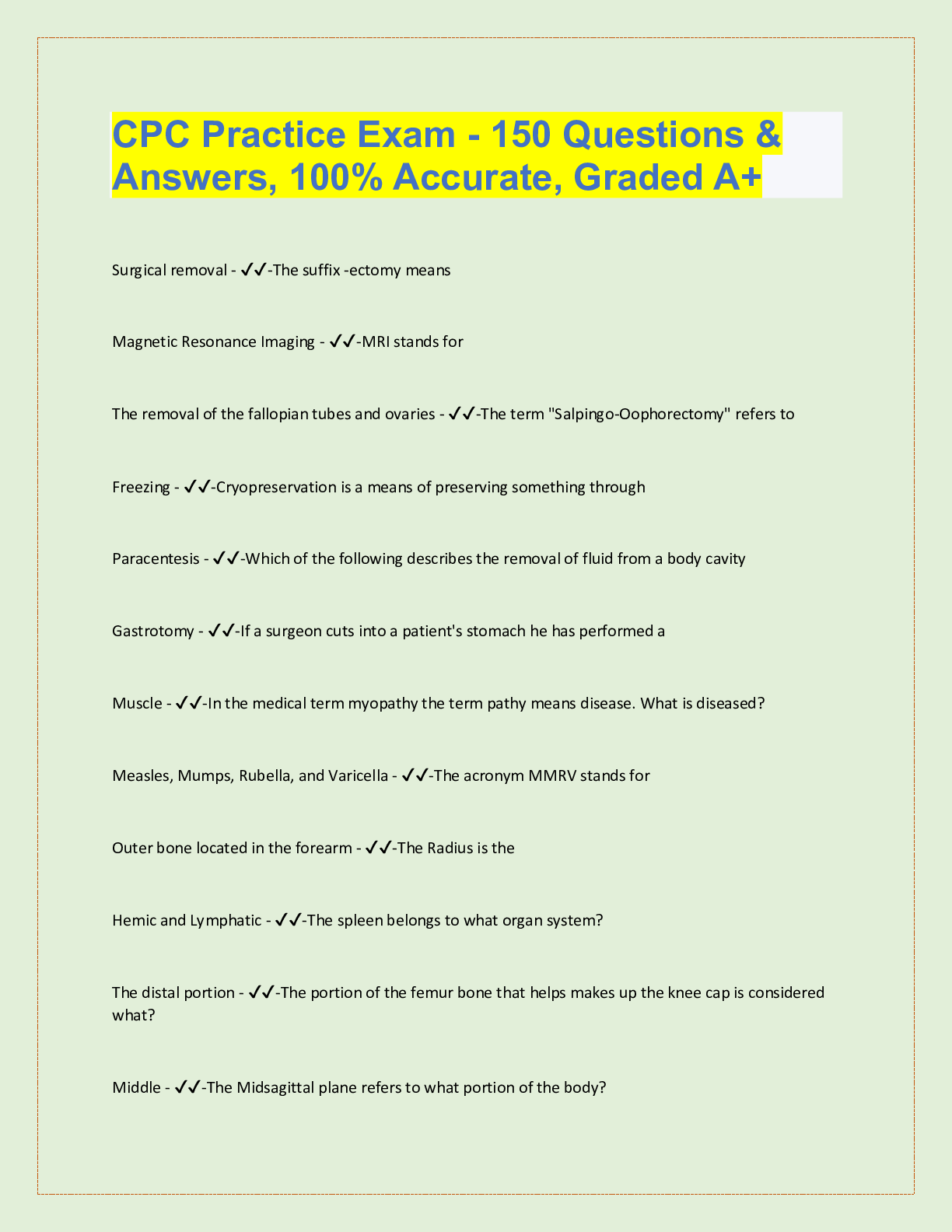Law > QUESTIONS & ANSWERS > AFRICAN CUSTOMARY LAW IND2601 EXAM PREP 65 Questions and Answers. (All)
AFRICAN CUSTOMARY LAW IND2601 EXAM PREP 65 Questions and Answers.
Document Content and Description Below
MCQ QUESTIONS 1) MCQ QUESTION Indigenous African people observe legal rules and most rules for living, due to factors such as…. 1) Faithfulness to Christian values 2) Fear of law-enforcing orga... ns such as the police 3) Public opinion and the fear of punishment 4) The availability of courts and judges 2) MCQ QUESTION Specialised and unspecialised systems are similar because….. 1) Emphasis falls strongly on the group 2) The relations governed by law are the same 3) Concrete evidence is very important 4) Law originates with the ancestors 3) MCQ QUESTION Which of the following factors influenced a person’s status in customary law? 1) Wealth 2) Class 3) Popularity 4) Rank 4) MCQ QUESTION A customary marriage can only be dissolved…. 1) On the grounds of irretrievable breakdown of the marriage 2) By a family court, or a competent division of the High Court or a divorce court, or an equality court 3) By the death of one of the spouses 4) If the court is satisfied that one of the parties has committed adultery resulting to the birth of a child 5) MCQ QUESTION Which of the following court are NOT recognised in terms of the Constitution to apply indigenous law in South Africa? 1) Courts of Traditional Leaders 2) Magistrate Courts 3) Labour Courts 4) The Supreme Court6) MCQ QUESTION In the case of Bhe and Others v Magistrate, Khayelitsha, and Others (Commission for Gender Equality as Amicus Curiae) 2005 (1) BCLR 1 (CC), the court declared the whole section 23 of the Black Administration Act 38 of 1927 and the regulations promulgated thereunder to be unconstitutional and invalid because…. 1) The Act was manifestly racist in its purpose and effect because it discriminated on the grounds of race and colour 2) The combined effect of section 23 and the regulations was to put in place a succession scheme which discriminated on the basis of race and colour applying only to white people 3) The discrimination it perpetrated was an affront to the dignity of white persons 4) It was inconsistent with the right to life guaranteed in section 11 of the Constitution 7) MCQ QUESTION The following are some of the main principles of the customary law court 1) Only adult males are free to attend the court sessions 2) The sessions of indigenous courts are held in private 3) All parties must be represented during trials 4) The onus is on the accused to prove his innocence in court 8) MCQ QUESTION Succession to traditional leadership in African customary law…. 1) Follows the principle of primogeniture 2) Is gender neutral 3) Is a hereditary system which follows the patrilineage 4) Only happens where the traditional leader dies without brothers 9) MCQ QUESTION Which of the following is NOT an example of indigenous law determinations? 1) The allocation or refusal of residential and agricultural land 2) The permission or refusal of immigration or emigration 3) The permission or refusal to gather natural products from communal land 4) The allocation of date to families for burial purposes 10) MCQ QUESTION In terms of the Traditional Leadership and Governance Framework Act 41 of 2003, the power to appoint a king vests with… 1) The president 2) The premiers of the different provinces 3) The National House of Traditional Leaders 4) Parliament11) MCQ QUESTION One of the indications that fundamental rights have priority over customary law is that the… 1) rights in the Bill of Rights may be limited by any law 2) courts must promote the values that underlie an undemocratic society 3) Bill of Rights is only applicable to customary law 4) Constitution is the supreme law 12) MCQ QUESTION A woman in customary law 1) May never inherit property from her deceased father 2) Has equal status and capacity with her husband in a customary marriage 3) Cannot acquire and dispose of assets if she is a wife in a customary marriage 4) Can succeed to the position of family head at her husband’s discretion 13) MCQ QUESTION Indicate which statement is NOT correct. The following can be regarded as good cause for a woman to terminate a betrothal agreement unilaterally 1) The man enters into an indigenous marriage with another woman during the betrothal period 2) The man’s morality, where a polygamous marriage was contemplated provided the woman condones this 3) Continuous neglect, so that the woman’s guardian has instruct the lover to proceed with the marriage 4) The man pays too much attention to other women and neglects his betrothed and her family 14) MCQ QUESTION Which of the following will the Premier of a province engage in to recognise a senior traditional leader, headman or headwoman? 1) Issue a notice in the provincial gazette recognising the person so identified 2) Call a tribal council meeting to announce the appointment 3) Appoint the particular traditional leader to the relevant House of Traditional leaders 4) Organise a celebration of the appointment in the community15) MCQ QUESTION The right to culture that is protected under section 30 and 31 of the Constitution implies that the state must… 1) Force all courts to apply and therefore recognise customary law 2) Ensure that the recognition of customary law is subject to the Bill of Rights 3) Preserve the existence and identity of cultural groups 4) Determine and pass legislation that is specifically applicable to customary law 16) MCQ QUESTION “Customary law means the customs and usages traditionally observed among indigenous African peoples of South Africa and which form part of the culture of those people”. This definition is found in…. 1) Section 1 of the Recognition of Customary Marriages Act 120 of 1998 2) Section1 of the Traditional Leadership and Governance Framework Act 41 of 2003 3) Section 1 of the Reform of Customary Law of Succession and Regulation of Related Matters Act 11 of 2009 4) Section 1 of the Black Administration Act 38 of 1927 17) MCQ QUESTION In customary law… 1) A successor succeeds to the assets and all the debts of his predecessor in KwaZulu-Natal 2) Succession is a duty that can be relinquished or ceded 3) A successor may never be removed from the line of succession i.e. disinherited 4) Succession takes place only on the death of a predecessor, there is thus no question of succession while the family head is still alive 18) MCQ QUESTION Indicate which statement is NOT correct. According to African customary law…. 1) The head of an agnatic group is always liable for the conduct of members of his group 2) A stick-fight is not a recognized cultural institution and therefore injuries sustained during such a fight would be unlawful and tantamount to assault. 3) It is accepted that a person may forcibly defend himself or his property, or other persons or their property, against an unlawful attack without being criminally liable 4) A small child and an insane person are not criminally liable for their unlawful conduct19) MCQ QUESTION Which of the following is a constitutionally acceptable form of punishment in customary law? 1) The death penalty 2) A fine 3) Banishment 4) Imprisonment 20) MCQ QUESTION According to African customary law, the crime of rape occurs when a man… 1) Unlawfully and intentionally hurts another’s body 2) Consents with a woman to have sexual intercourse 3) Uses violence to force a woman not married to him to have sex with him 4) Removes a woman’s clothes to have sex with him 21) MCQ QUESTION One of the implications of section 211(3) of the Constitution of the Republic of South Africa is that…. 1) The recognition and application of customary law is subject to legislation that specifically deals with customary law 2) Only customary courts may apply and therefore also recognise customary law 3) The recognition and application of customary law is subject to the Black Administration Act 38 of 1927 4) The Congress of Traditional Leaders of South Africa (CONTRALESA) will determine when customary law is applicable 22) MCQ QUESTION General property would include…. 1) Earnings of family members, include the earnings of a midwife and medicine woman 2) Clothing, walking sticks, snuff boxes, necklaces and weapons 3) Property given to a woman on her marriage, such as household utensils and a certain beast that is given to her during her marriage, such as the ubulungu beast 4) Property of the family head’s mother’s house to which he has succeeded23) MCQ QUESTION A traditional leader…. 1) May decide on any matter concerning nullity, divorce or separation in respect of a civil marriage between black people 2) May impose a punishment which entails death, mutilation, grievous bodily harm or imprisonment 3) Is competent to hear any crime in accordance with common law, African customary law or any statutory crime referred to by the Minister 4) Is prevented from punishing any person, including a non-black, for contempt of his court in facie curiae (in the face of the court) 24) MCQ QUESTION In terms of the Recognition of Customary Marriages Act… 1) Marriages not registered in terms of the Act are void 2) Parties to an unregistered marriage are liable to a fine 3) Unregistered marriages are awarded the status of a union 4) The customary marriage is not void for failure to register 25) MCQ QUESTION The conflict between customary law norms and provisions of fundamental rights outlawing discrimination… 1) Is not specifically resolved by the Constitution 2) Is directly regulated by section 2 and 36(i) of the Constitution 3) Is directly regulated by 5(8)(i) of the Constitution 4) Is specifically resolved by the provisions of section 8 and 39(i) of the Constitution 26) MCQ QUESTION Prior to 5 December 2002, intestate estates of black persons were administered by the… 1) Magistrate’s court 2) Tribal court 3) Traditional court 4) High court27) MCQ QUESTION In terms of the court’s decision in the case of Shilubana v Nnamitwa…. 1) Traditional authorities may update and change customary law to fit in with the living customary law 2) Traditional communities may develop customary law in accordance with norms and values of the Constitution 3) Traditional authorities should always align and develop customary law in accordance with norms and values of the Constitution 4) Traditional authorities should make sure that customary law is aligned with gender considerations 28) MCQ QUESTION The Sotho maxim “kgosi ke kgosi ka batho” (a king or ruler is a king or ruler through his people) means that the ruler must…. 1) Act in accordance with the will of his people 2) Consider the decisions of only his council when making decisions 3) Not be unfair when making administrative determinations 4) Consulted when members of his community make family decisions 29) MCQ QUESTION Specialised and unspecialised systems are different because in the unspecialised systems 1) Emphasis falls strongly on the group 2) A transgression of the law and legal rules will have certain, specific consequences for the transgressors 3) Relations are governed by law 4) Decisions are only taken by the family head 30) MCQ QUESTION The betrothal agreement 1) Is an enforceable contract in customary law 2) Cannot be repudiated or terminated at any time 3) Gives rise to a claim of breach of contract, in cases where it is terminated 4) Creates certain rights and duties for the parties involved 31) MCQ QUESTION In customary law, succession 1) Takes place on the death of the principal wife 2) Follows the principle of primogeniture 3) Is a duty that cannot be relinquished or ceded 4) Prevents a family head from transferring a younger son from one house to another house without a son during his lifetime32) MCQ QUESTION Which of the following statements apply to the ukutheleka custom? 1) It is practised by some Sotho tribes 2) It entails that the wife is “kidnapped” by her people 3) It is used for the maintenance of the woman 4) It means that the lobolo is delivered in instalments 33) MCQ QUESTION Section 211(3) of the 1996 Constitution has the following implications 1) The recognition and application of customary law is subject to the Bill of Rights 2) All courts may apply and must recognise customary law 3) It is not necessary for judges to have any formal training in customary law 4) The recognition and application of customary law is subject to general legislation 34) MCQ QUESTION The ukungena custom is applied where 1) The husband is incapable of having children 2) The husband dies without a son 3) The tribal wife dies without a son 4) The tribal wife is incapable of having children 35) MCQ QUESTION Which of the following factors influence a person’s status in customary law? 1) Wealth 2) Class 3) Popularity 4) Rank 36) MCQ QUESTION The concrete versus the abstract approach that is characteristic of customary law means that 1) While specialised legal systems adopts a abstract approach, unspecialised legal systems are more concrete, real visible in approach 2) Specialized legal systems are marked by visible acts such as signing of a marriage register to signify the conclusion of a marriage contract 3) In specialised legal systems, performance or part performance is required in the formulation of contracts 4) Proof for adultery in specialised legal systems was obtained by catching the culprit in the act and taking some of his personal belongings37) MCQ QUESTION Which sentence below must accurately describes the effect of section 39 of the Constitution? 1) When interpreting the Bill of Rights, a court, tribunal or forum may consider foreign law 2) When interpreting the Bill of Rights, a court, tribunal or forum may consider international law 3) When interpreting the Bill of Rights, a court, tribunal or forum must promote the spirit, purport and objects thereof 4) When interpreting the Bill of Rights, a court, tribunal or forum may promote the values that underlie an open and democratic society based on human dignity, equality and freedom 38) MCQ QUESTION Ukuvusa custom may be applied if 1) A married man dies childless 2) An unmarried male dies 3) A female dies childless 4) The wife cannot bear children 39) MCQ QUESTION Which of the following are some of the known presumptions in indigenous law? 1) The children of a married woman are the children of her husband 2) An adult is insane until there is evidence to the contrary 3) A person may voluntarily entrust pieces of personal clothing to a stranger 4) A person may voluntarily lie prostrate to be hit at the back40) MCQ QUESTION People voluntarily observe legal rules and the rules for living in African customary law because of the following factors: 1) The religious or sacral (holy) element of the law, private opinion and the knowledge that if a person is harmed, that person will endeavour to get compensation or will take measures to protect him or herself 2) The religious or sacral (holy) element of the law, the knowledge that if a person is harmed, that person will endeavour to get compensation or will take measures to protect him or herself, fear of punishment and the fact that only the indigenous leaders in the community have a broad general knowledge of the law 3) The religious or sacral (holy) element of the law, knowledge that if a person is harmed, that person will endeavour to get compensation or will take measures to protect him or herself, public opinion, and fear of punishment 4) The religious or sacral (holy) element of the law, the knowledge that if a person is harmed, that person will endeavour to get compensation or will take measures to protect him or herself, and the influence of the police, courts and judges in the community 41) MCQ QUESTION In indigenous law…. 1) A successor succeeds to the assets and all the debts of his predecessor in KwaZulu-Natal 2) Succession is a duty that can be relinquished or ceded 3) A successor may never be removed from the line of succession i.e. disinherited 4) Succession takes place only on the death of a predecessor, there is thus no question of succession while the family head is still alive42) MCQ QUESTION The main principles of the African customary court are…. 1) The onus is on the accused to prove his innocence in court, the sessions of the customary court are held in public, all court sessions are open to members of the public and may be attended by any adult person, even strangers, all parties must be present during the trial, legal representation was unknown, all proceedings were conducted orally and no written record of cases was kept 2) The onus is on the accused to prove his innocence in court, the sessions of the customary court are held in camera, all court sessions are open to members of the public and may be attended by any adult person, even strangers, all parties must be present during the trial, legal representation was unknown, all proceedings were conducted orally and no written record of cases was kept 3) The onus is on the accused to prove his innocence in court, the sessions of the customary court are held in public, all court sessions are open to members of the public and may be attended by any adult person, even strangers, all parties may not be present during the trial, thus judgment by default was known, legal representation was unknown, all proceedings were conducted orally and no written record of cases was kept 4) The onus is on the accused to prove his innocence in court, the sessions of the customary court are held in camera, all court sessions are open to members of the public and may be attended by any person, even children, all parties must be present during the trial, legal representation was unknown, all proceedings were conducted orally and no written record of cases was kept 43) MCQ QUESTION In former days, the crime of contempt of the ruler was punished in one of the following ways: 1) A warning 2) Imprisonment 3) A fine 4) A reprimand44) MCQ QUESTION Some of the powers and duties of the National House of Traditional Leaders include that 1) It may consider Parliamentary Bills referred to it by the Secretary to Parliament in terms of section 18 of the Traditional Leadership and Governance Framework Act 41 of 2003 2) It must enhance co-operation between the House and the various provincial houses with a view to addressing matters of common interest 3) It may perform tasks as may be determined by a member of the national Cabinet or as may be provided for in national legislation 4) It must be consulted on provincial government development programmes that affect ordinary communities 45) MCQ QUESTION The characteristic of customary law is expressed as group verses individual orientation means that…… 1) Emphasis of the law is placed on the parties concerned in a dispute 2) Although the family head was nominally the owner of the family property, he was not liable for debts of the other members of the family home 3) Individuals function within the context of the group to which they belong 4) The right emanating from the seduction of a girl could only be claimed from the perpetrator by herself to the exclusion of family members 46) MCQ QUESTION One of the following sections in the Constitution of South Africa does not signify recognition of customary law. Which one is it? 1) Section 2 2) Section 15 3) Section 31 4) Section 112 47) MCQ QUESTION The group has identified a leader amongst them and wish to appoint him as a senior traditional leader in their new community. Whom can they approach to make the appointment? 1) The President of South Africa 2) The Premier of their Province 3) The Provincial House of Traditional Leaders 4) The National House of Traditional Leaders48) MCQ QUESTION Which statement illustrates some of the steps that need to be taken by the appointing authority in effecting the appointment? 1) Notify the previous traditional leader of the intention to recognise and appoint the new leader 2) Publish the appointment in the Government Gazette 3) Notify the National House of Traditional Leaders 4) Send a copy of the letter of appointment to the office of the President of the Republic of South Africa 49) MCQ QUESTION Section 4(1) of the Traditional Leadership and Governance Framework Act 41 of 2003 lists functions of traditional councils 1) 2 2) 4 3) 8 4) 12 50) MCQ QUESTION The effect of the decision taken in the Moseneke case was that between 2002 and 2004, an intestate estate of a black person reported to the Master was administered in terms of …. 1) Customary law 2) Native law 3) Zulu code 4) Common law 51) MCQ QUESTION The Recognition of Customary Marriages Act 120 of 1998 recognizes polygynous marriages, defined as 1) A woman marrying more than one man 2) A man marrying more than one woman 3) A woman marrying another woman 4) A man marrying not more than one woman52) MCQ QUESTION The implications of section1 of the Law of Evidence Amendment Act 45 of 1988 are that 1) Indigenous law must not be opposed to the principles of public policy or natural justice 2) It is necessary for judges or magistrates to have any formal or practical knowledge of, or training in, indigenous law 3) All courts must take judicial notice of indigenous law 4) Evidence about indigenous law must comply with common law principles 53) MCQ QUESTION Family rank 1) Refers the hierarchy of family members within the family group 2) Relates to a person’s legal position within a nuclear family and to the hierarchy of the various houses that make up a household 3) Is determined by a combination of factors such as class and wealth 4) Is also determined by rank of the father and the mother in a particular house 54) MCQ QUESTION Which of the following statements apply to lobolo? 1) It is a separate contract in a customary marriage 2) It may be described as cattle or other property which, in consideration of an intended customary or civil marriage, the intended groom delivers to the bride’s family 3) It entitles a man to the child-bearing capacity of his wife after it has been paid to her family group 4) It may be delivered and transferred only during the bride’s lifetime 55) MCQ QUESTION African customary law 1) Is transmitted in writing from one generation to the next 2) Recognised a system according to which indigenous courts are bound to precedent 3) Believes that there are supernatural forces at work in the universe 4) Focuses on the rights of the individual person 56) MCQ QUESTION According to the Oliviers, the legal requirements for a customary union entered into outside KwaZulu-Natal are the 1) Consent of the bride and the groom 2) Existence of a civil marriage 3) Negotiation of lobolo4) Transfer of the bride to the bridegroom’s family group 57) MCQ QUESTION A traditional leader may hear and decide civil cases….. 1) Which are instituted by black people against black people 2) Of people residing anywhere in South Africa 3) Concerning nullity, divorce or separation in respect of a civil marriage between black people 4) Involving offences of murder in their communities 58) MCQ QUESTION Which of the following refers to a person who keeps guard while his / her mate commits a crime? 1) An accomplice 2) A co-perpetrator 3) An accessory 4) A co-accused 59) MCQ QUESTION Which of the following does NOT constitute a ground for justification in criminal indigenous law? 1) Impossibility 2) Executing an official order 3) Institutional action 4) Lack of intent 60) MCQ QUESTION Succession to traditional leadership in indigenous law…. 1) Follows the principle of primogeniture 2) Is gender neutral 3) Is a hereditary system which follows the patrilineage 4) Only happens where the traditional leaders dies without brothers 61) MCQ QUESTION One of the main objects of dispute resolution in customary law is… 1) To determine the guilty party 2) To assist the parties to be friends 3) To reconcile the parties 4) To share a meal after the trial62) MCQ QUESTION The traditional indigenous marriage….. 1) Was dissolved by the husband and wife as individuals 2) Could only be dissolved by a court of law 3) Resulted in the establishment of a new house estate 4) Could only be concluded between individuals who were majors 63) MCQ QUESTION Which of the following statement is NOT applicable where either of the prospective spouses to a customary marriage is a minor? 1) Both his or her parents or if he or she has no parents, his or her legal guardian must consent to the marriage 2) The commissioner of child welfare may grant consent to the marriage if the consent of the parent or guardian cannot be obtained 3) The commissioner of child welfare may give consent even if either of the parents or guardian refused to grant consent 4) The Minister of Home Affairs may grant written permission to conclude the marriage 64) MCQ QUESTION In customary law, house property… 1) Belongs to a particular house under the household as a whole 2) Is controlled by the family head 3) Includes property of the family head’s mother’s house to which he has succeeded 4) May be defined as property that belongs to a person who has acquired it, although it may be under the control of the family head 65) MCQ QUESTION What purpose is the fine for contempt of court is used for in customary law 1) The maintenance of messengers 2) Payment of the salary of the traditional council members 3) As an offering to the ancestors 4) Compensation to the court for time its members spent on the case 66) MCQ QUESTION Which of the following persons are competent to testify in indigenous law 1) Only the parties to the trial 2) Only children above the age of puberty 3) A co-accused for or against one another 4) An intoxicated person67) MCQ QUESTION The difference between a crime and a delict is that…. 1) In a crime the community is harmed, whereas in a delict individuals or agnatic group is harmed 2) In a crime the individuals are harmed, whereas in a delict the community is harmed 3) In a crime the property of an individual or group is affected whereas in a delict public property is affected 4) A crime is punishable by community service whereas a delict is punishable by solitary confinement 68) MCQ QUESTION Which of the following statements is true in respect of punishment that a traditional leader may impose? 1) He may impose a sentence which entails death 2) He may impose a fine of R400 3) He may not impose a corporal punishment 4) He may impose a prison sentence 69) MCQ QUESTION Which of the following is an element of a crime in indigenous law? 1) The act must be performed in broad daylight 2) The act must be unlawful 3) The act must be performed by several people against one person 4) The act must be against cultural institutional actions 70) MCQ QUESTION Which of the following is NOT an example of customary law determinations? 1) The allocation or refusal of residential and agricultural land 2) The permission or refusal or immigration or emigration 3) The permission or refusal to gather natural products from communal land 4) The allocation of date to families for burial purposesLONG QUESTIONS 1) QUESTION a) Customary public law governs the relations between traditional authorities and subjects, and the relations between these authorities and subjects within the tribe: Discuss the subdivision of Customary Public Law (10) Customary public law governs the relations between traditional authorities and subjects, and the relations between these authorities within the tribe. Customary public law may be subdivided as follows: ● Indigenous constitutional and administrative law, this is that part of customary law which relates to the composition, powers and functions of the public organs of authority. In the case of a tribe the highest authority is the tribal chief, and in the case of a kingdom it is the king. The tribal chief has various councils that help him to perform his duties. A tribe is usually subdivided into several (territorial) wards. Each ward is headed by a headman, assisted by a system of councils. In former times, the tribal chief, together with his councils, had the power to legislate. The chief-in-council had to see to it that these laws and (other community rules) were applied. The chief and each headman had a court in which cases were tried. The administration of justice legal systems also have officials specially charged with administering justice, but the public takes an active part in the proceedings, which always take place in the open. The public freely takes part in the crossexamination and the discussion of the case and forms part of the court procedure. Also, negotiations for extrajudicial (ie, outside the court) settlement take place between the family groups concerned, and not between individuals. The tribal chief is, for instance, not only law-maker and executive official, but also judge-in-chief. The views of the people present in court, and not previous decisions, lead to a judgment, because the people in court interpret the public sense of justice. ● The indigenous adjudicatory organs and the law of procedure. This is that part of customary law that deals with the composition and jurisdiction of the various indigenous or customary courts and the various procedures that must be followed when cases are brought before the court and tried, and when judgment isexecuted. It also relates to the evidence that may be lead in court in order to reach a decision. ● Indigenous criminal law. This is that part of the law that deals with public action against a subject with the purpose of punishing the subject when he transgresses a rule that is punishable by law. b) Name and describe the factors that promote the observance of customary law (10) ● The religious or sacral (holy) element of the law. (Think of examples of your own religious beliefs and also keep in mind what we said earlier on about the belief in ancestral spirits. ● Public opinion, and particularly sensitivity about what other people may think and say about one's behaviour. (In customary law, the interests of the community are very important). ● The knowledge that, if a person is harmed, that person will endeavour to get compensation or will take measures to protect him- or herself. (African customary law, for instance, allows for the use of all kinds of medicines to protect a person from harm. Don't forget what we said about sorcery earlier on.) ● The fact that everybody in the community has a broad general knowledge of the law. This is because there is general participation in the legal process, and the law is handed down, orally, from one generation to the next. In short, everybody has an opportunity to find out how the law operates in that particular society. ● Fear of punishment. Especially punishment of supernatural origin, when the conduct in question conflicts with accepted legal principles. ● The influence of indigenous leaders in the community. These people are regarded as the living representatives of the ancestors and are responsible for the community's observance of the law, without there necessarily being, or even before there is, any question of a formal legal ruling. 2) Q2 QUESTION (JUN 2011) a) List the implications of Section 211 of the Constitutional Act of 1996 (5)● All courts must apply and therefore also recognize customary law. ● The recognition and application of customary law are subject to the Bill of Rights. ● The recognition and application of customary law are subject to legislation that specifically deals with this. This implies that only legislation aimed at amending customary law is relevant and not legislation in general. ● The courts determine when customary law is applicable. Courts thus have a discretion to decide whether customary law is applicable in a particular case. This discretion should be exercised in agreement with the general principles of choice of law. With regard to the general principles of choice of law, we are of the opinion that, where it is not clear whether customary law is applicable, a party can, by appealing to the right of choice of culture (sections 30 and 31), request that customary law be applied. This freedom of choice, however, is not absolute: the choice of one person, may, for example, not infringe the rights of another. Where rights have been derived from customary law, the courts are obliged to protect those rights, assuming that both parties reasonably expect to be subject to customary law. The principles of public policy and natural justice are not synonymous with the fundamental rights contained in the Bill of Rights. Nor should these principles be used to avoid the serious questions about the constitutional validity of customary law. Section 211(3) is explicit in that the application of customary law is subject to the Bill of Rights, implying that these principles are no longer necessary. Bennett (Human rights 60) is also of the opinion that this condition must be seen as part of the colonial past, and of historical significance only. b) Explain the main conflict between customary law principles, and the fundamental rights in the constitution? (5) NO there is no clear answer: Conflict between customary law and the Bill of Rights is unavoidable. The principle of male primogeniture (whereby the eldest son of the family head is the heir upon the death of the family head) is inherent to Africanculture and customary law, but obviously discriminates against women. Also, the Bill of Rights emphasises individual rights, whereas in customary law the emphasis is on the group, the community, and the individual in the context of the community; again, the Bill of Rights emphasises, as its name implies, rights, whereas customary law emphasises duties. The question is: how should this conflict be dealt with? The Constitution does not contain a clear answer to this question. There are, however, indications that fundamental rights have priority over customary law. These indications are the following: ● section 2, which provides that the Constitution is the supreme law ● section 8 (1), which provides that the Bill of Rights is applicable to all legislation, thus including customary law ● section 36 (2), which provides that no fundamental rights will be limited by any law, except as provided for under section 36 (1) or any other provision of the Constitution ● section 39 (1), which requires the courts to promote the values that underlie an open and democratic society based on human dignity, equality and freedom in interpreting the Bill of Rights ● section 39 (2), which provides that, in interpreting any law and applying and developing common and customary law, the courts must have due regard for the spirit, purport (purpose) and objects of the Bill of Right ● section 36 (1), which allows the rights in the Bill of Rights to be limited by “law of general application” (including customary law), provided that such limitation is reasonable and justifiable in an open and democratic society If it is accepted that the application of customary law is a constitutional right, and not only a freedom, it means that customary law is equal in status to any of the other fundamental rights. In the event of conflict, the fundamental rights that are in conflict must be balanced against one another. The fundamental rights mentioned in the Constitution are not arranged in a hierarchical order, that is, from more important to less important. The promotion and protection of one category of fundamental rights does not exempt the authority (state) from promoting and protecting anothercategory of rights. Also, it may not lead to oppression of, or discrimination against, certain categories of people (eg women). [Show More]
Last updated: 1 year ago
Preview 1 out of 129 pages
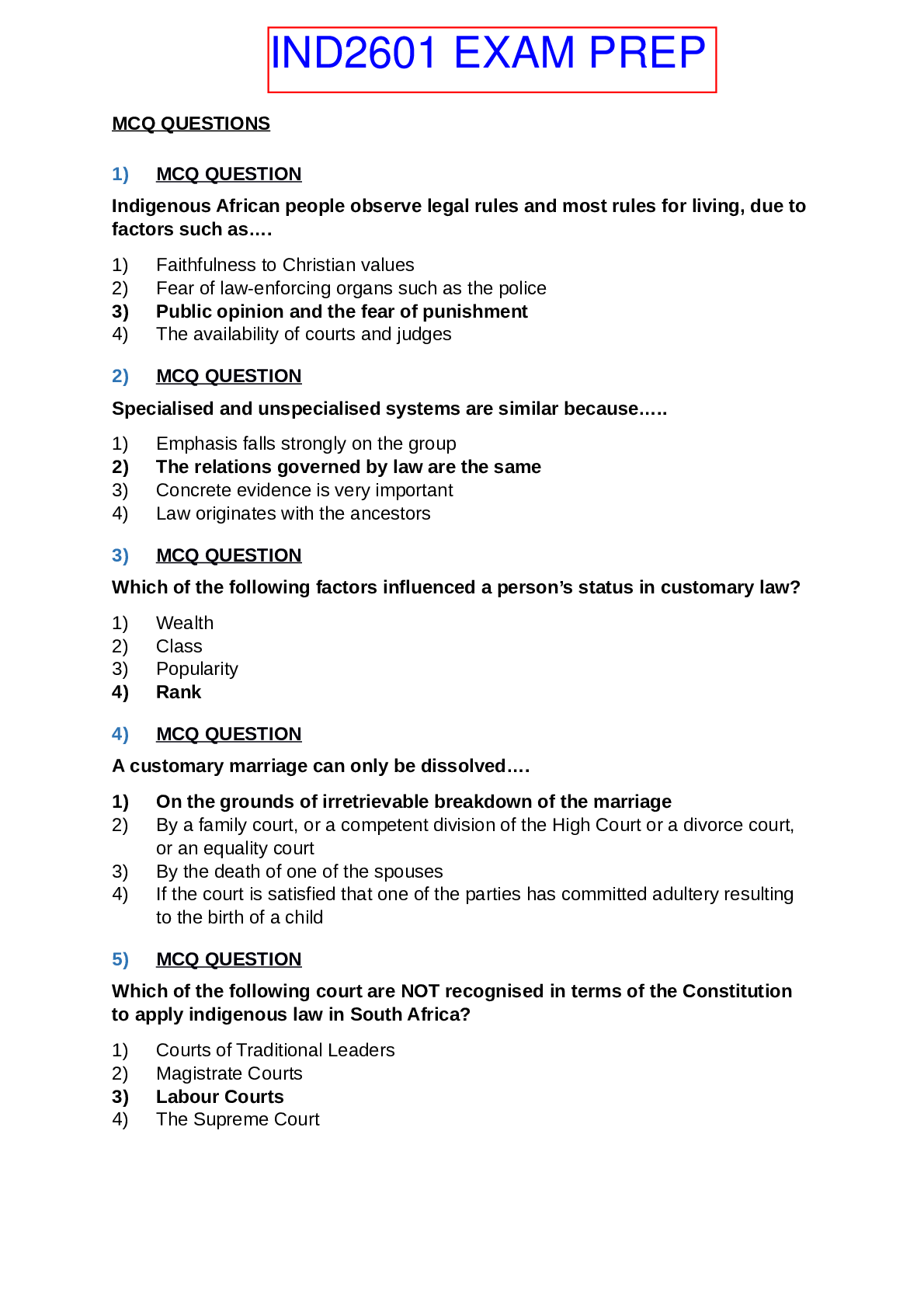
Reviews( 0 )
Document information
Connected school, study & course
About the document
Uploaded On
May 15, 2022
Number of pages
129
Written in
Additional information
This document has been written for:
Uploaded
May 15, 2022
Downloads
0
Views
101

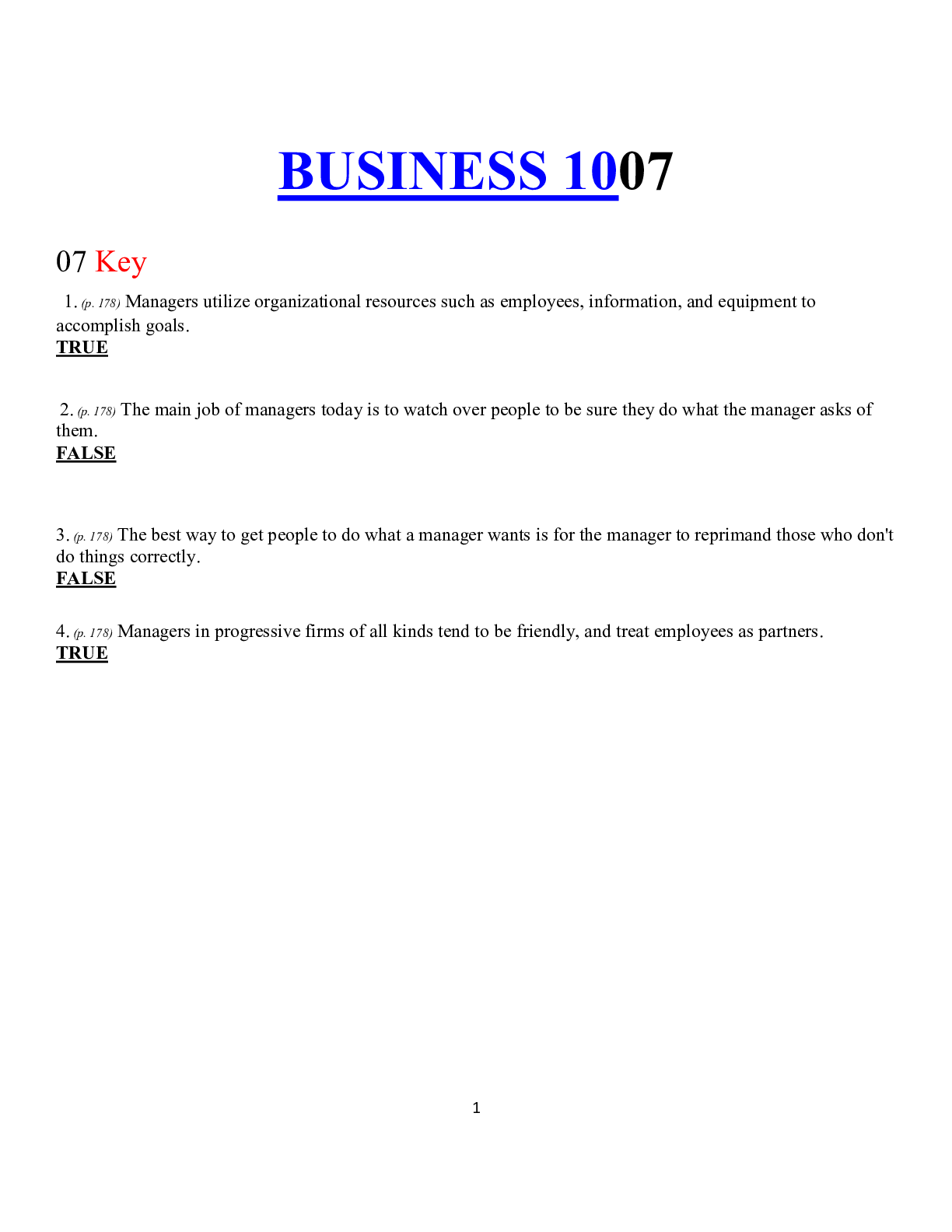
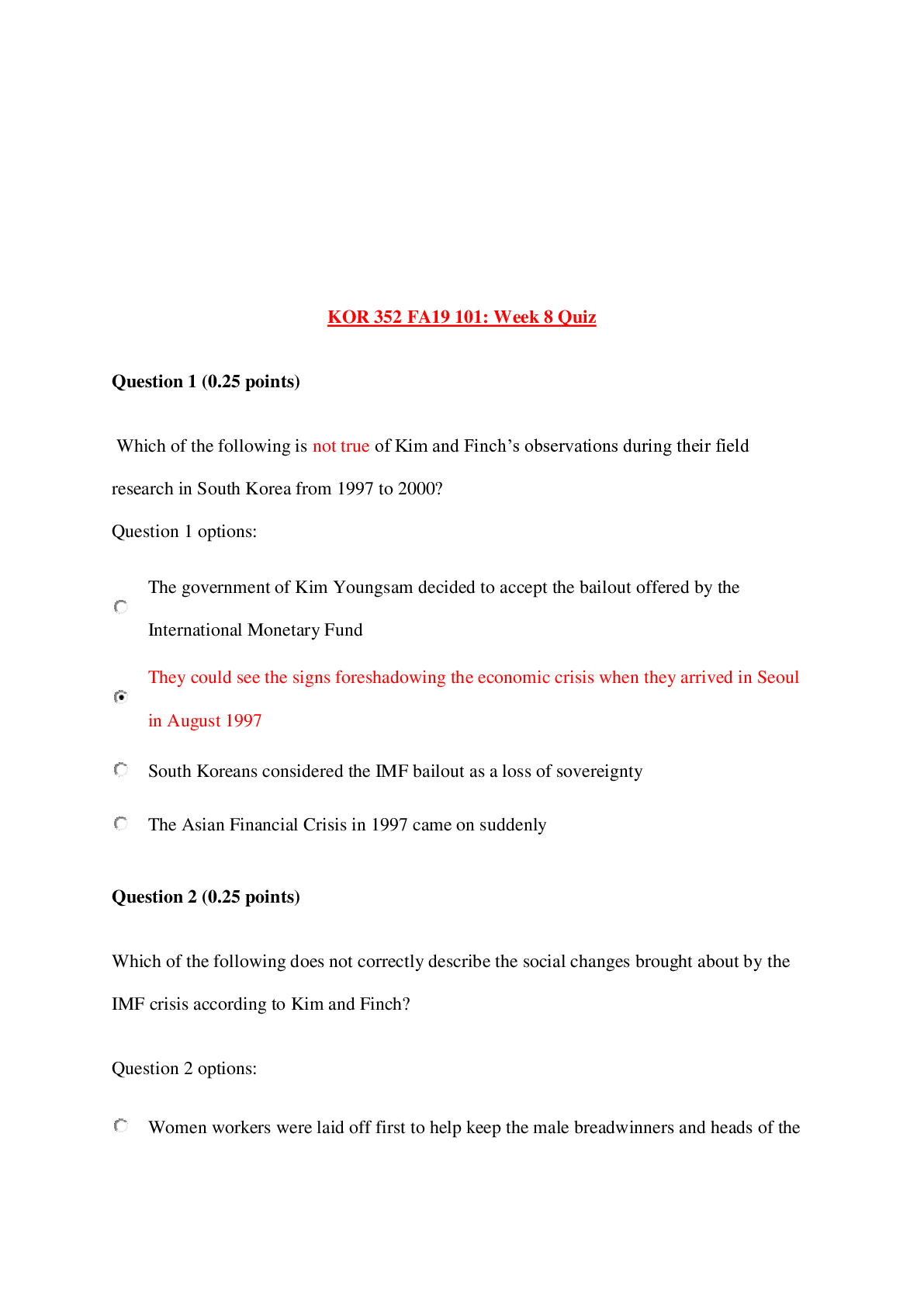
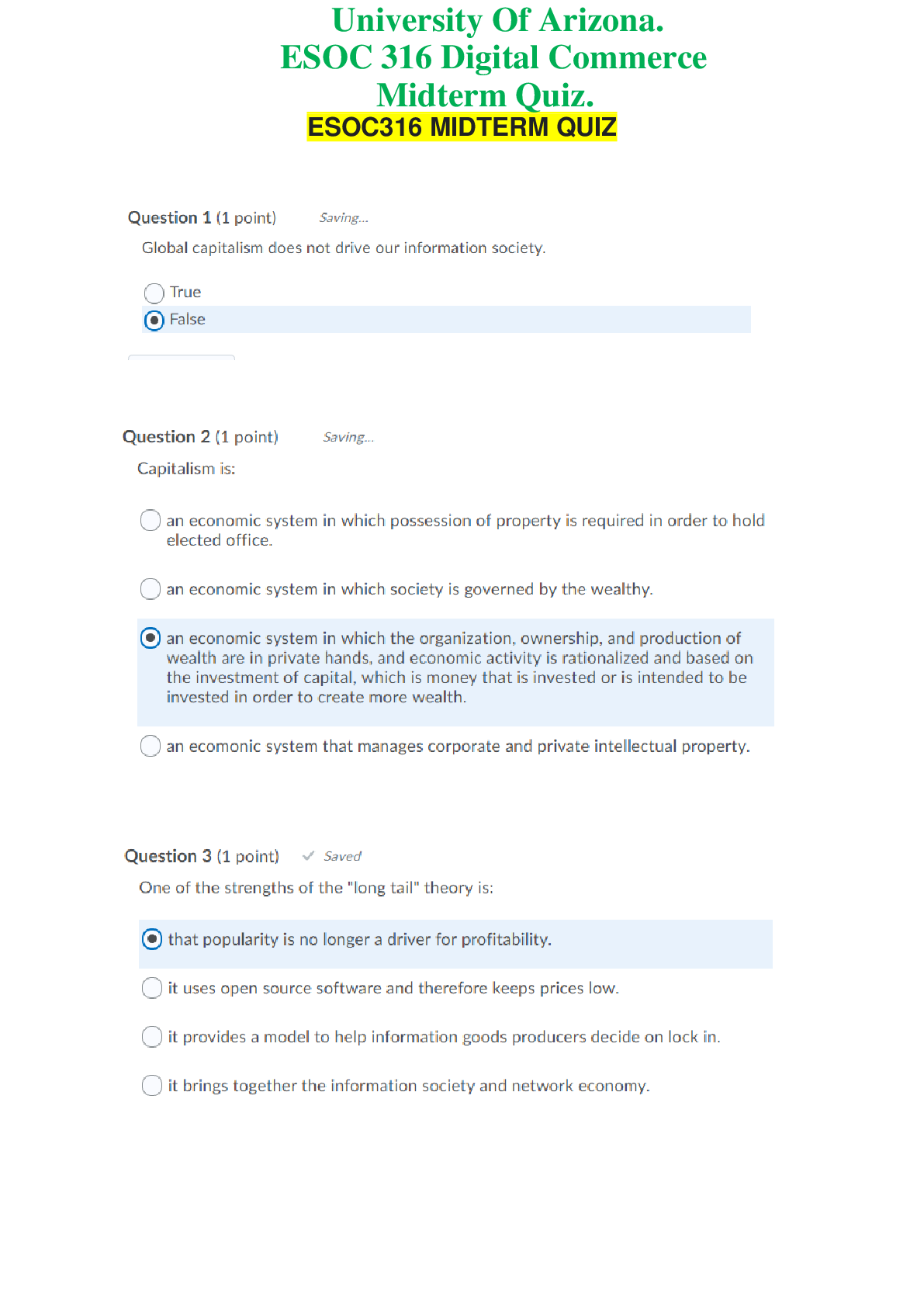
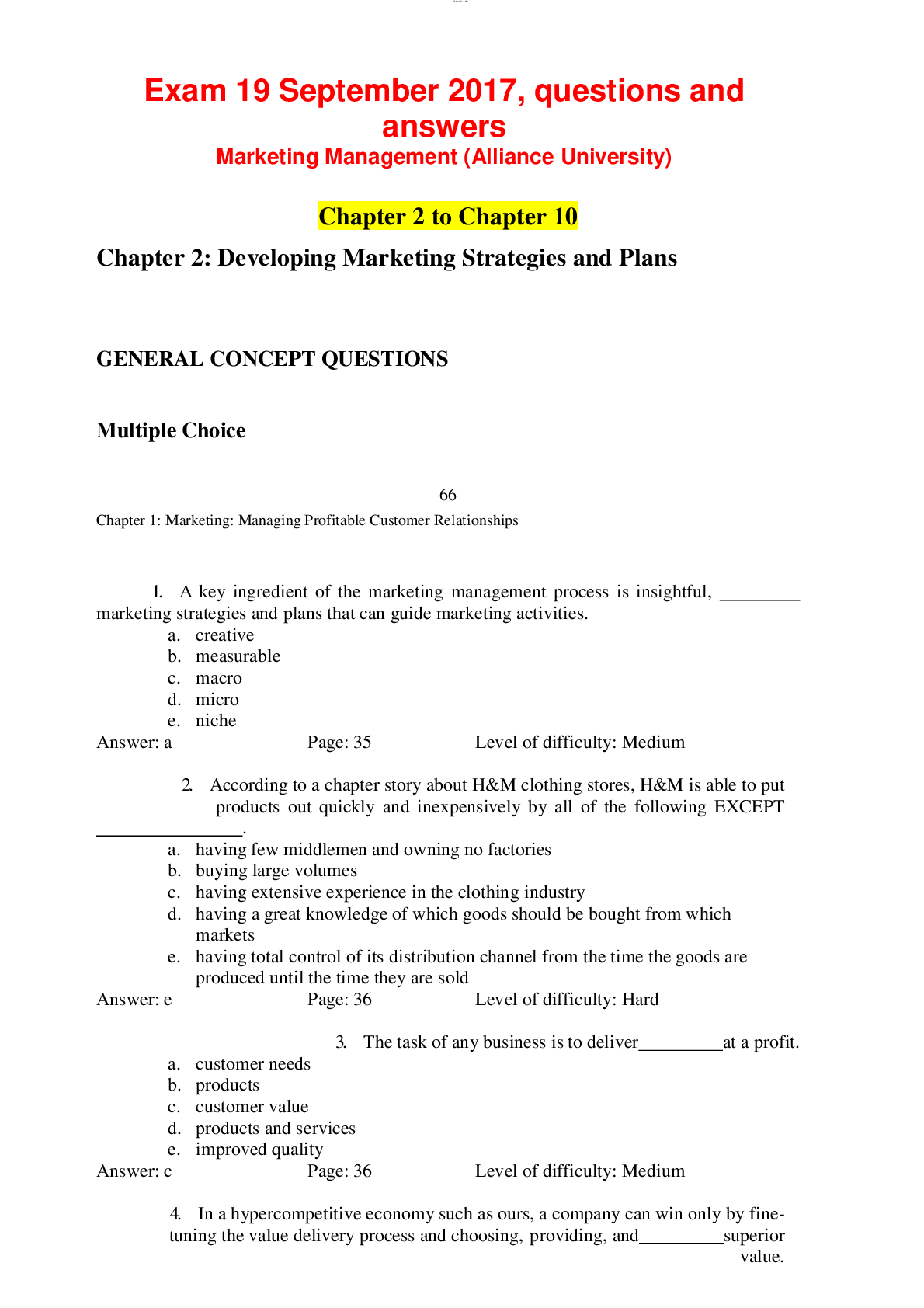
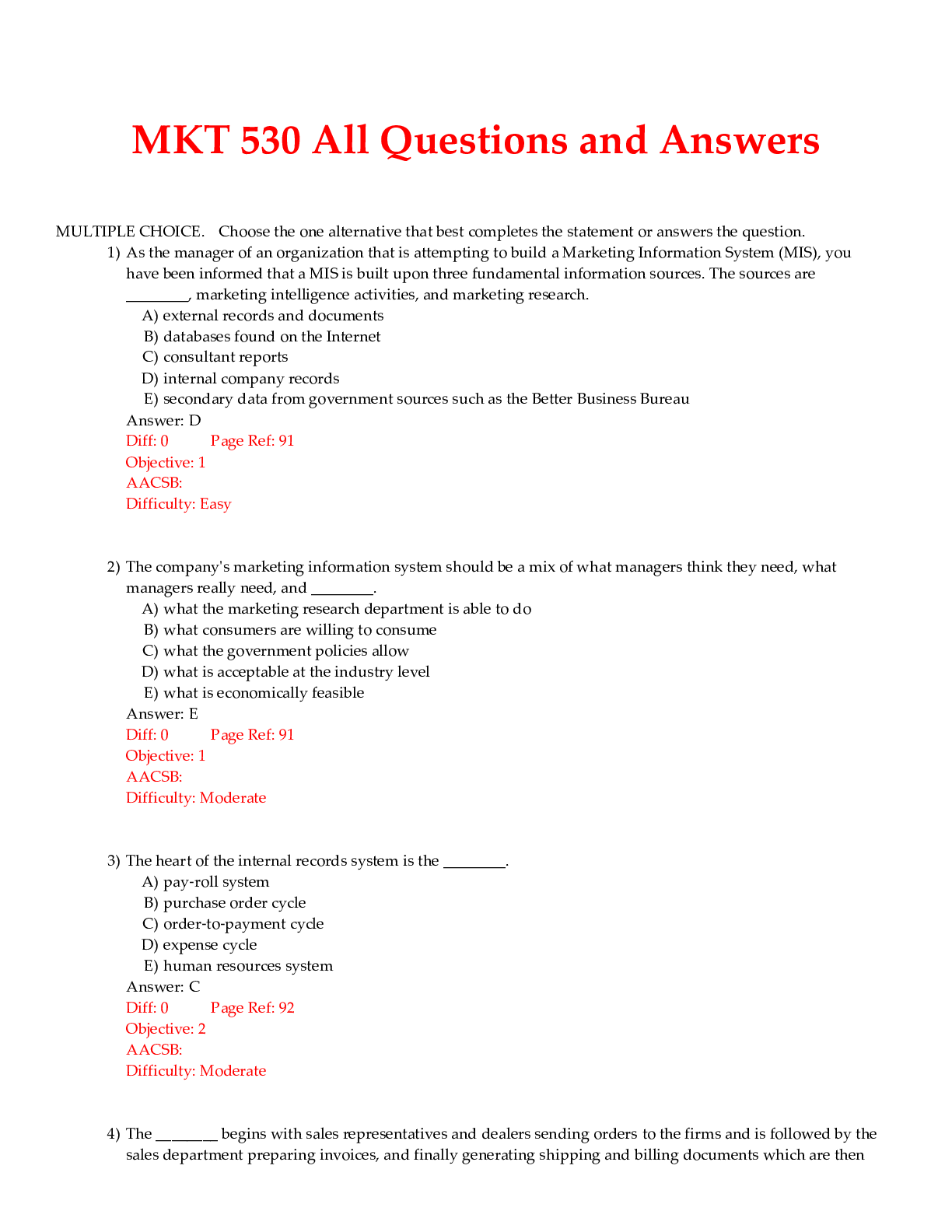
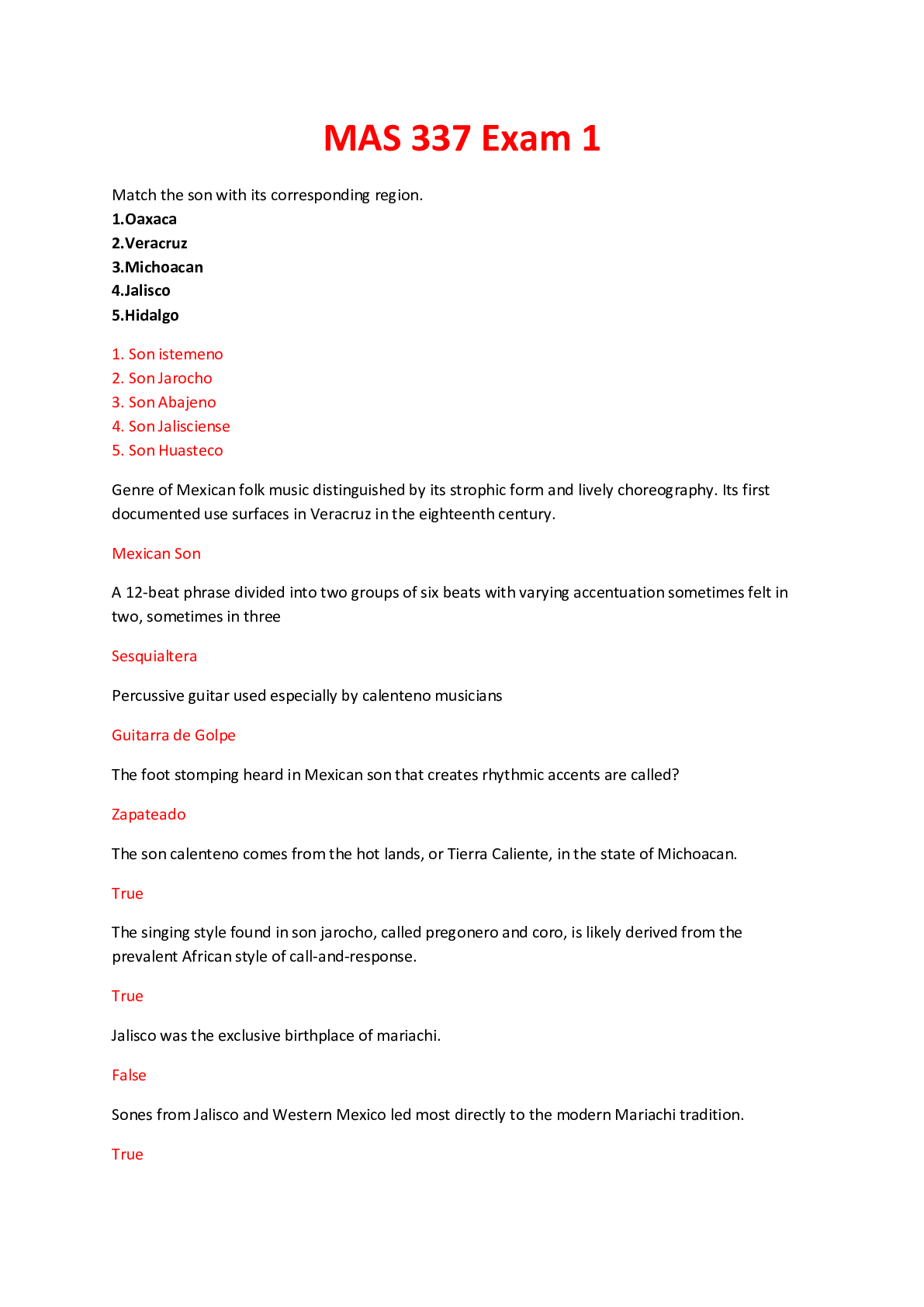
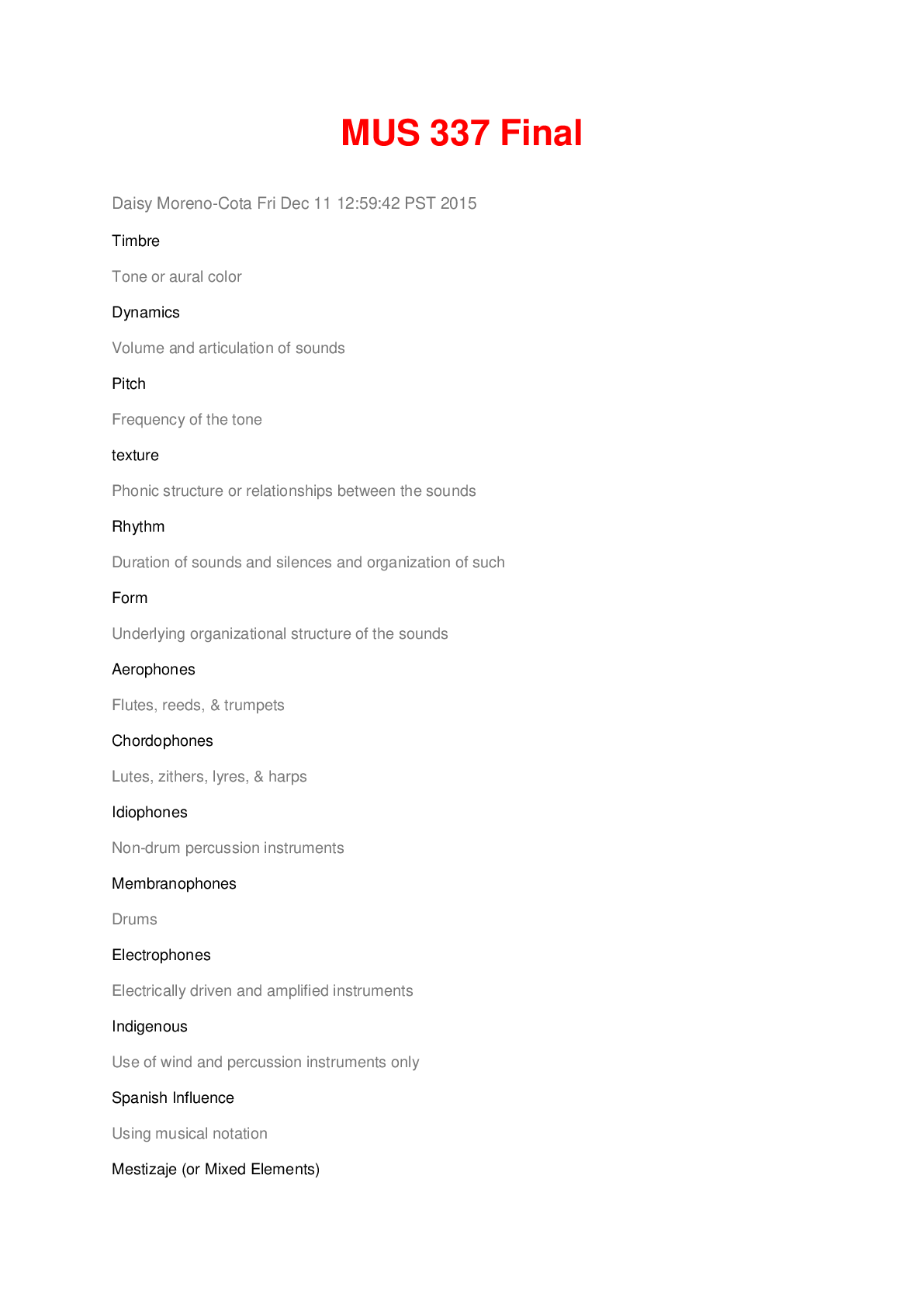
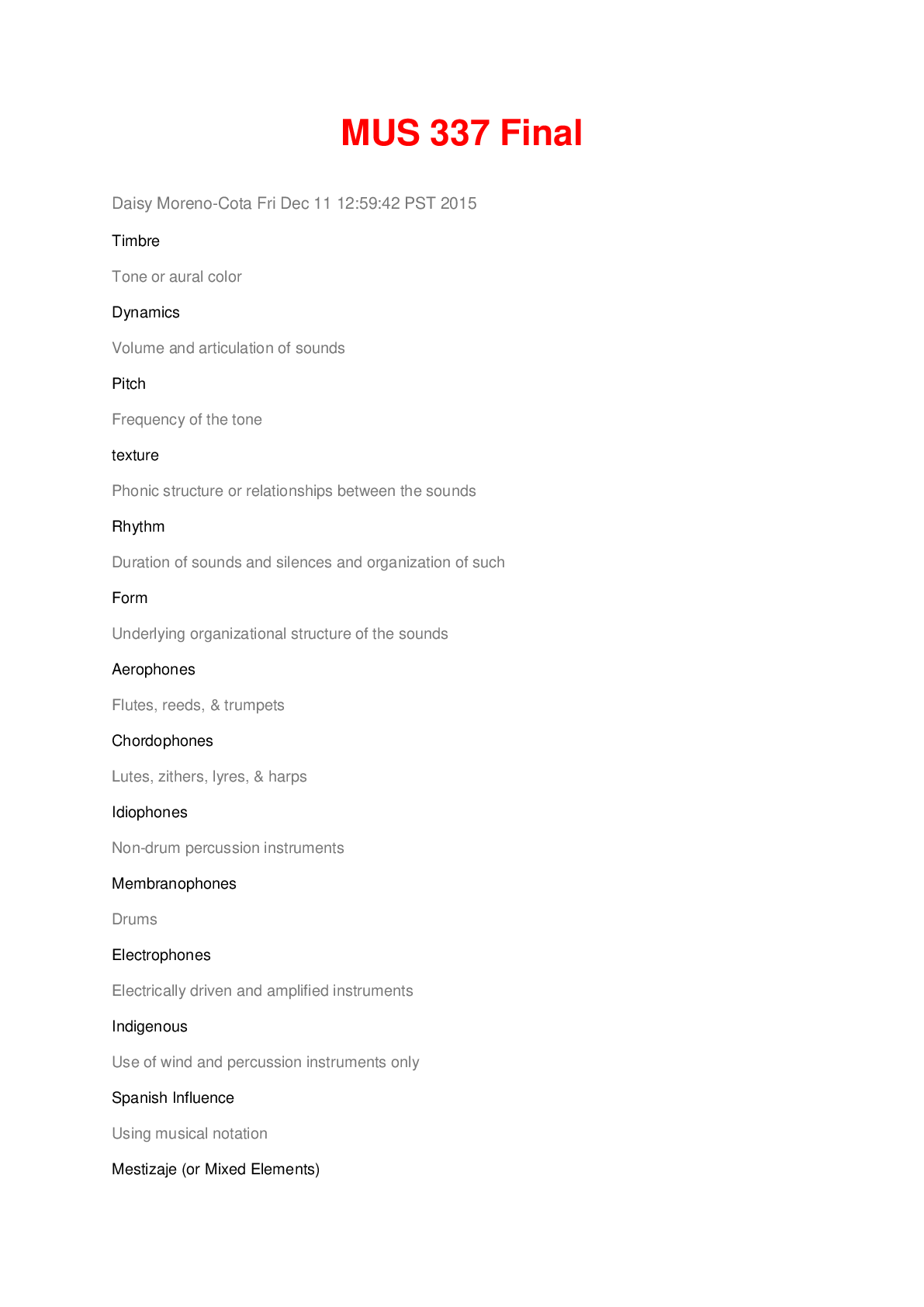
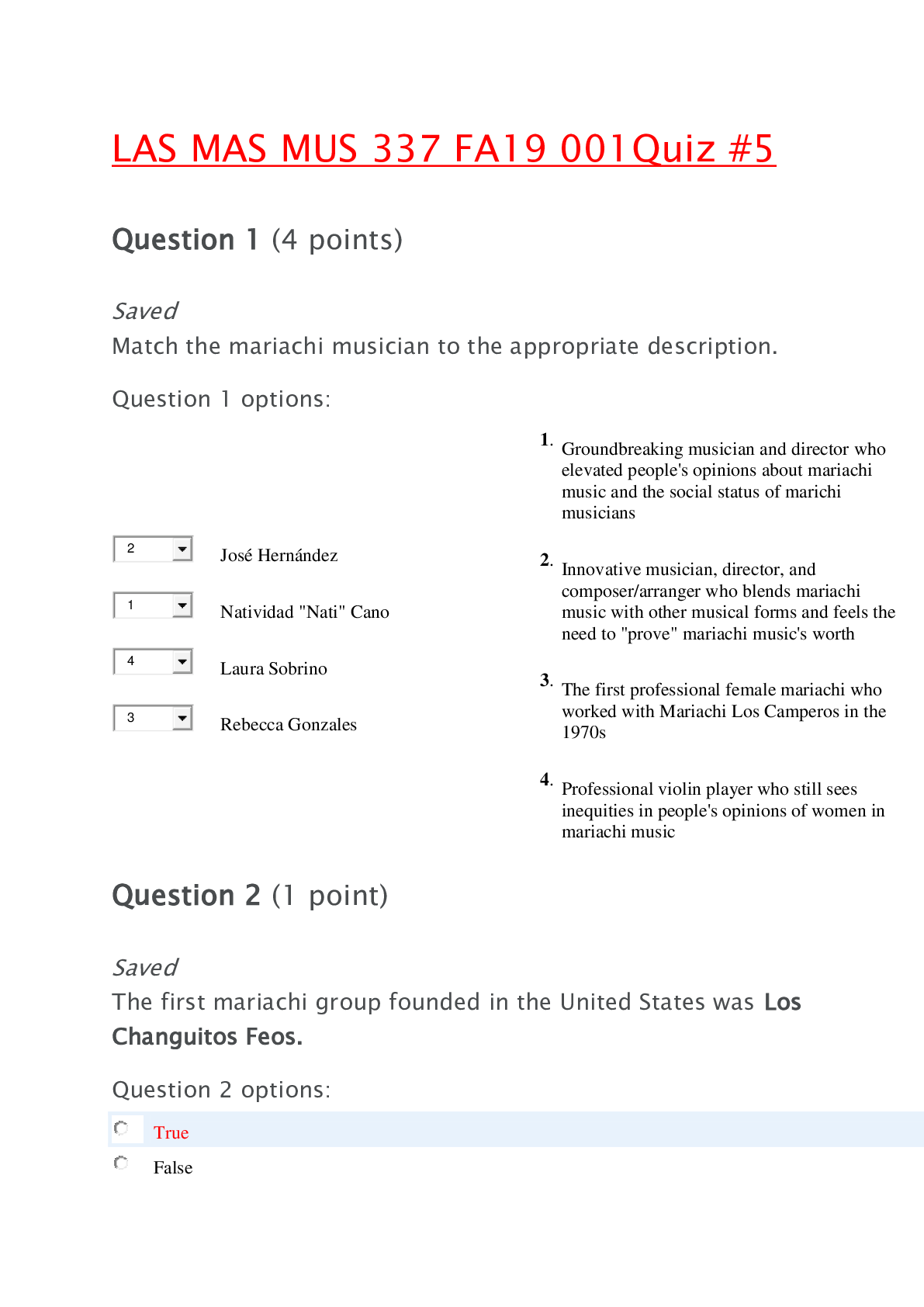
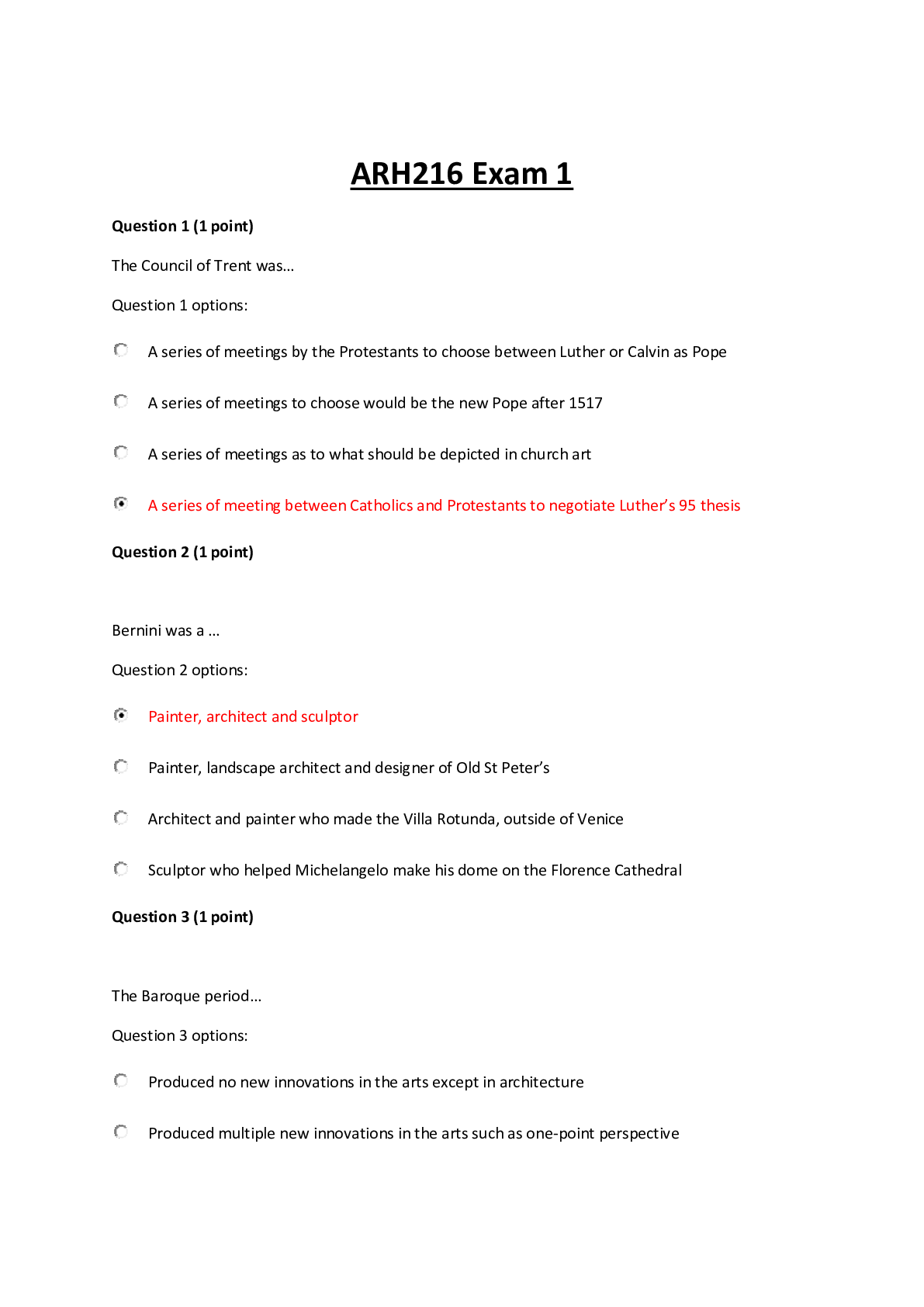
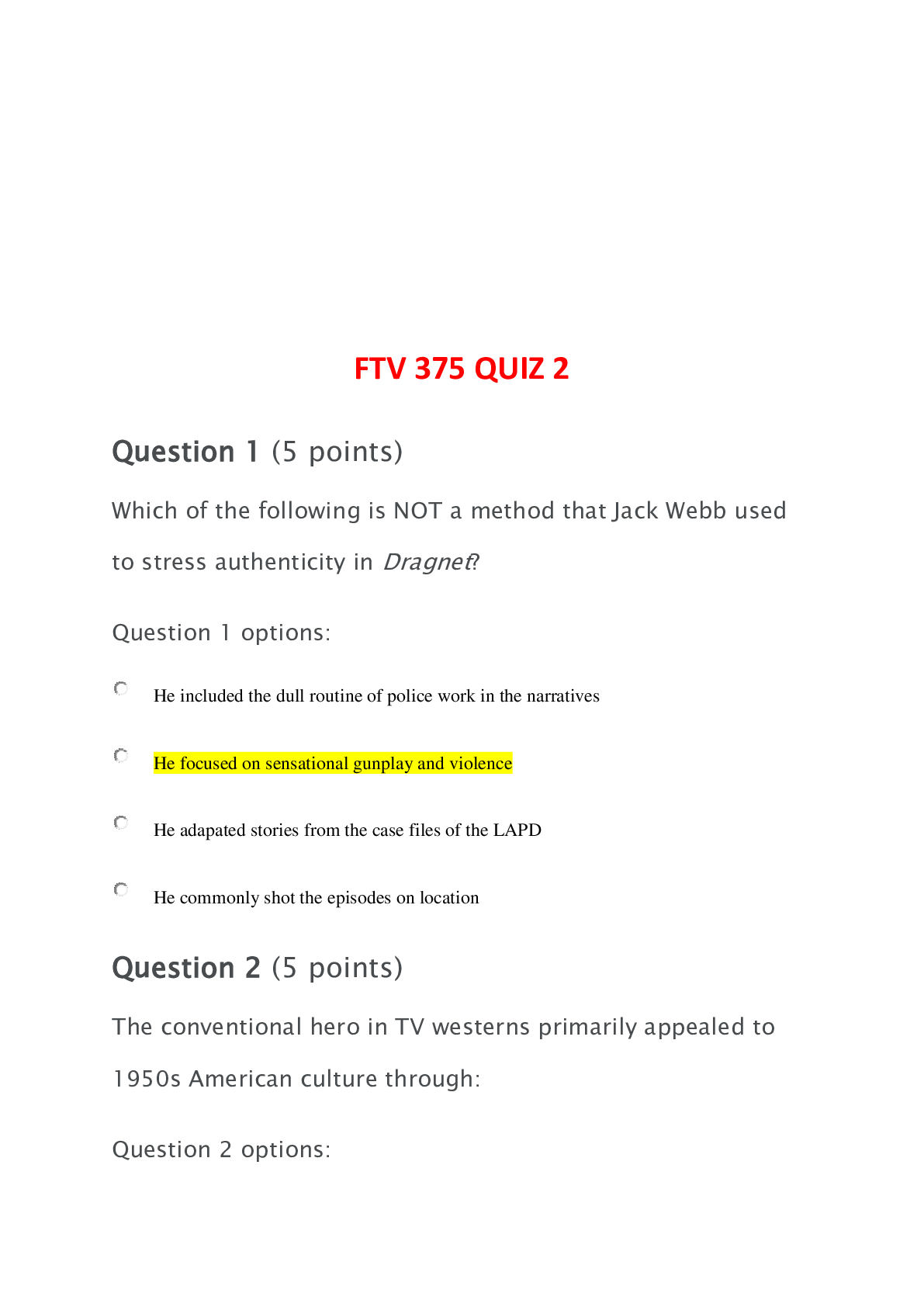
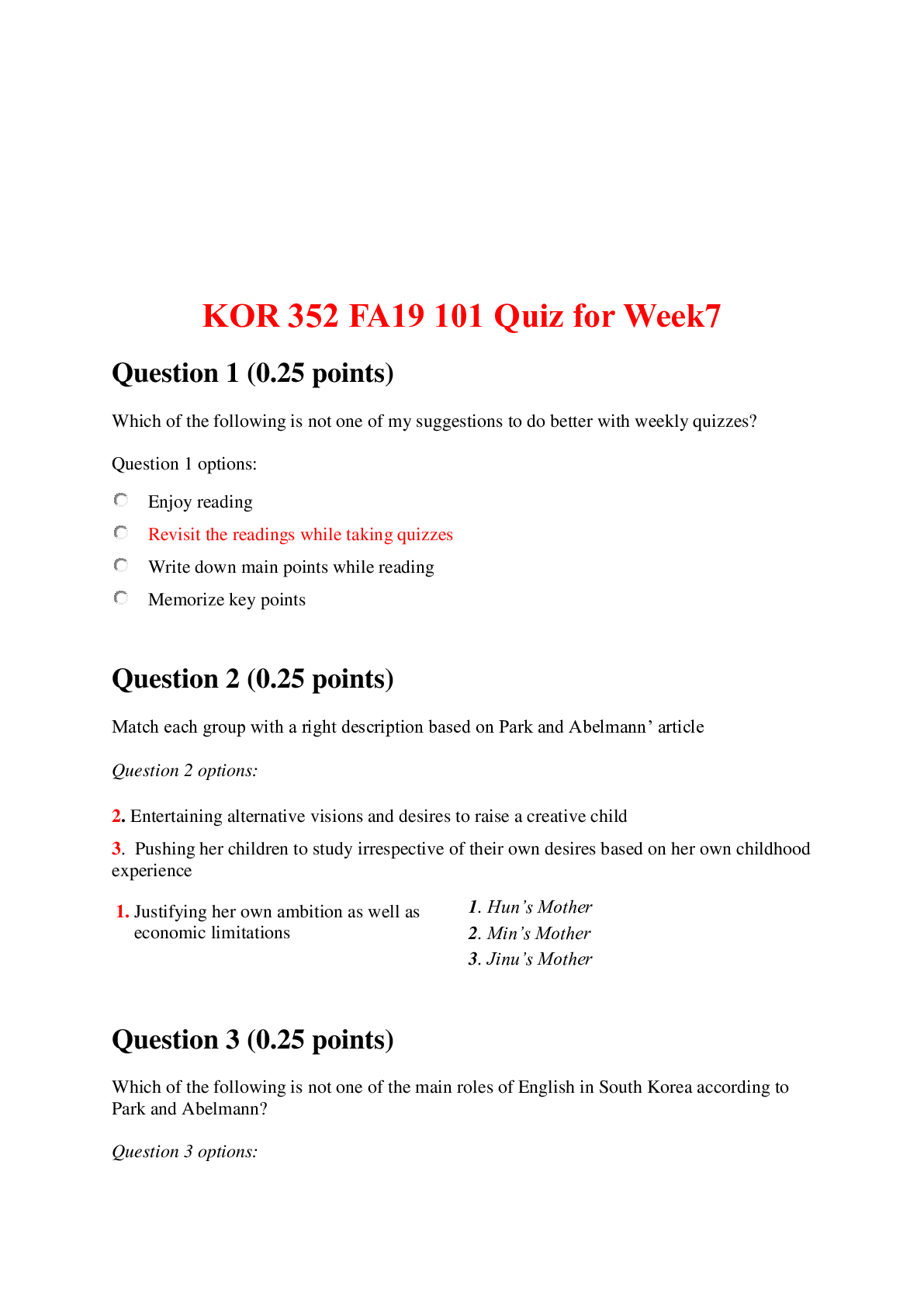
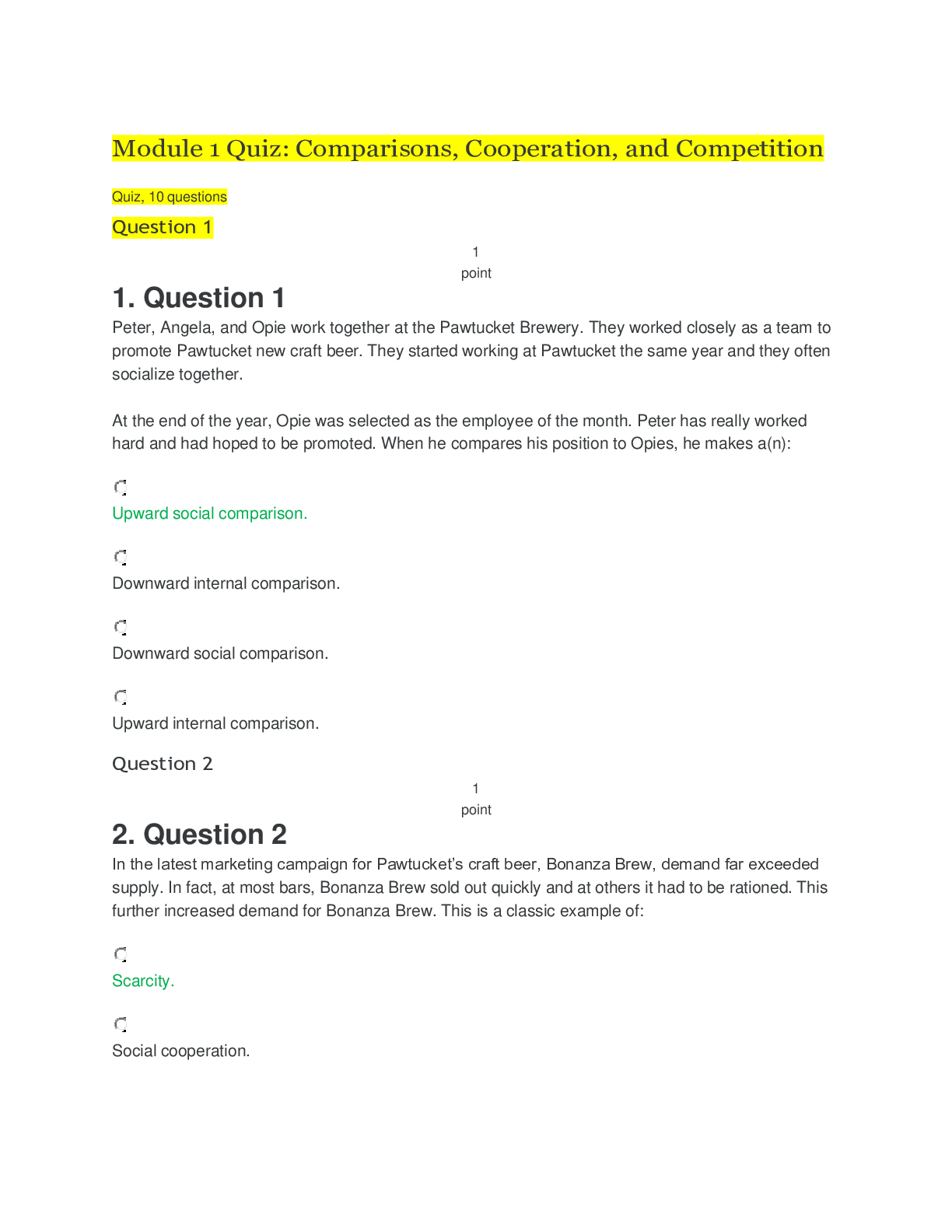
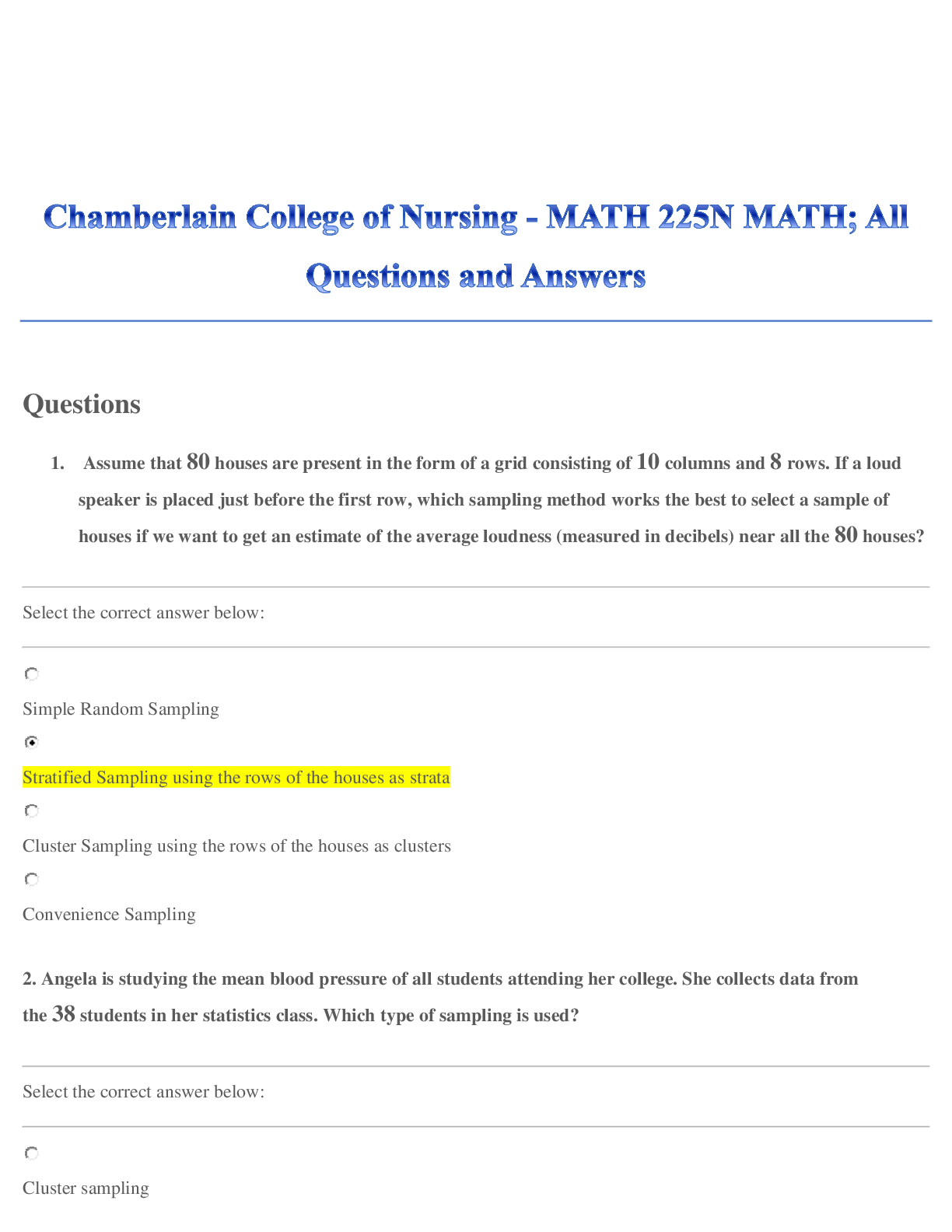
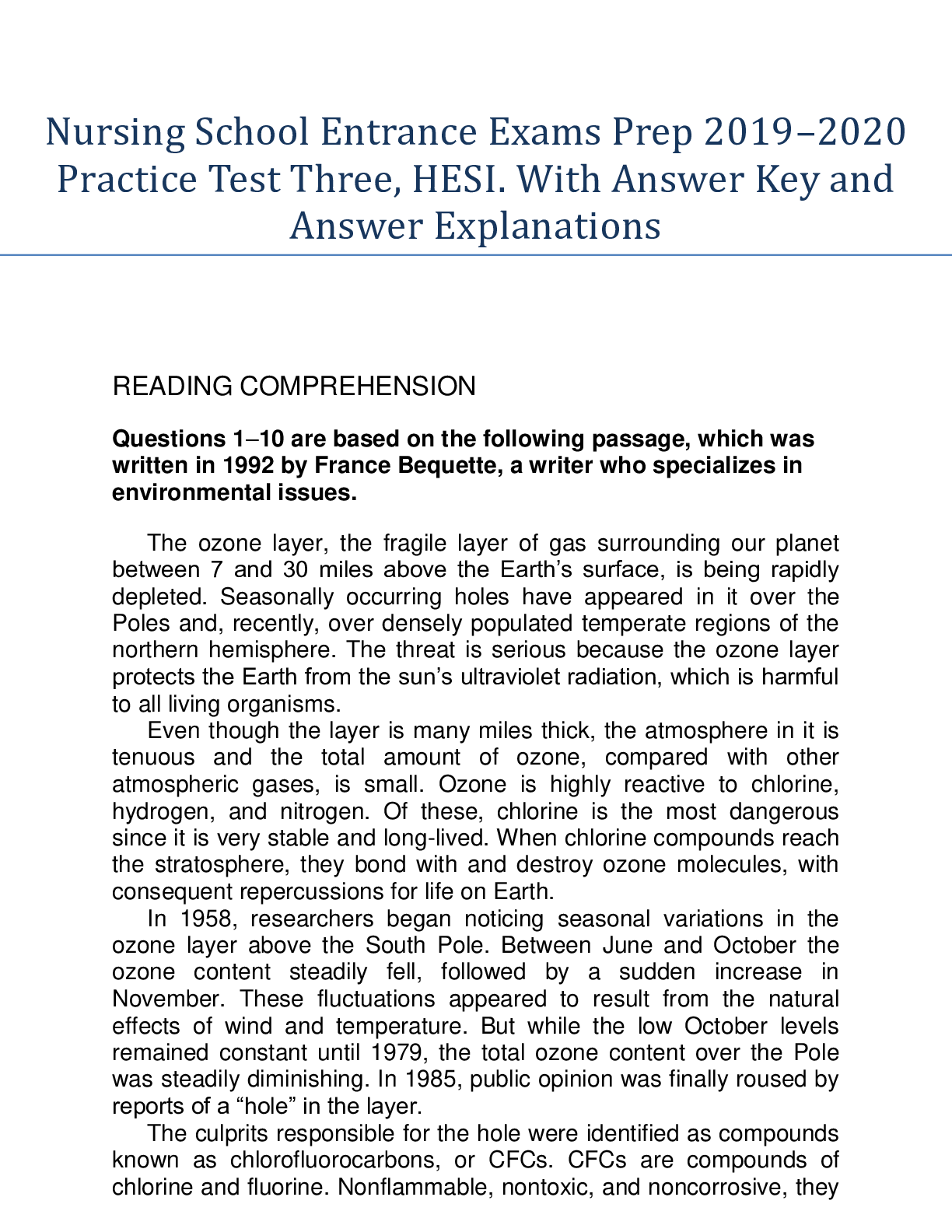
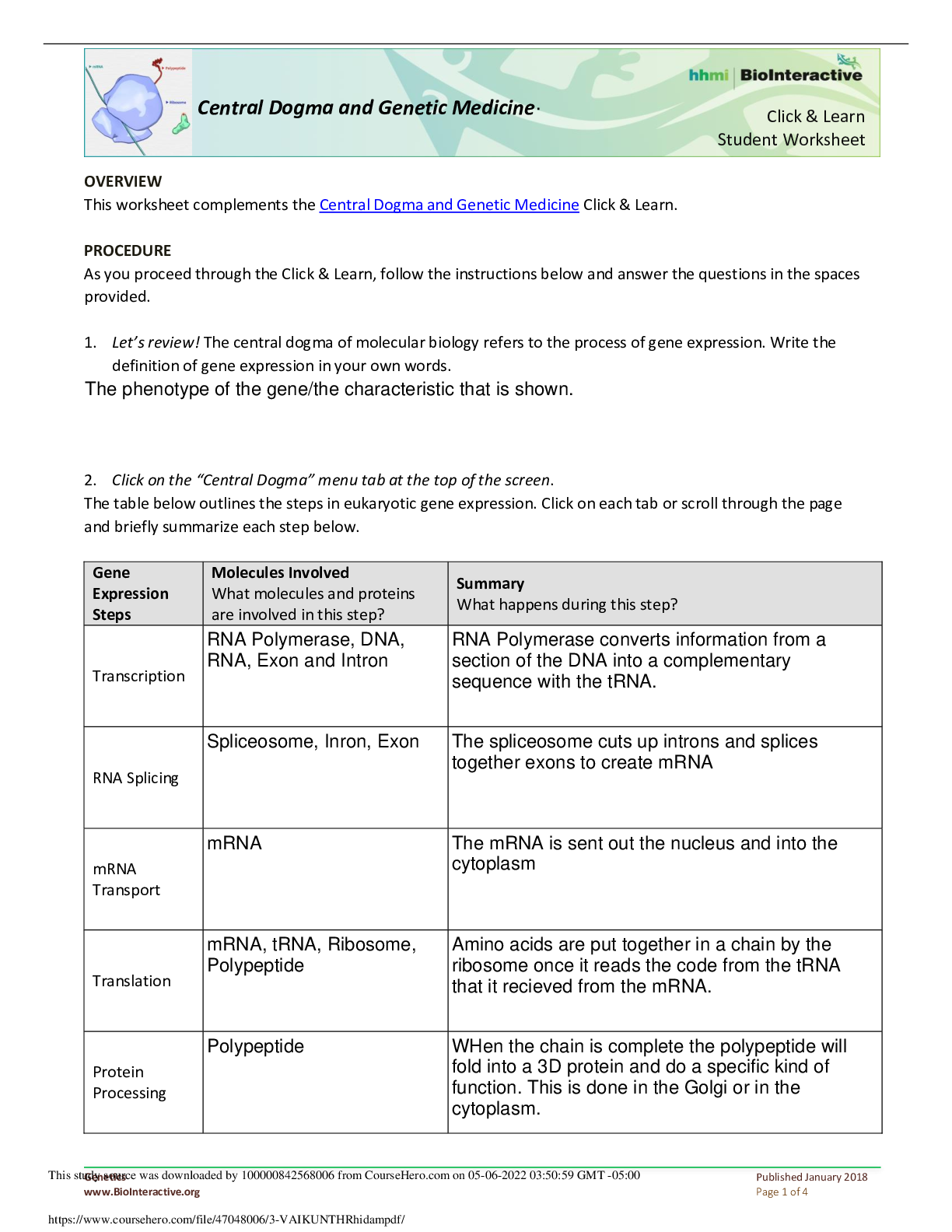
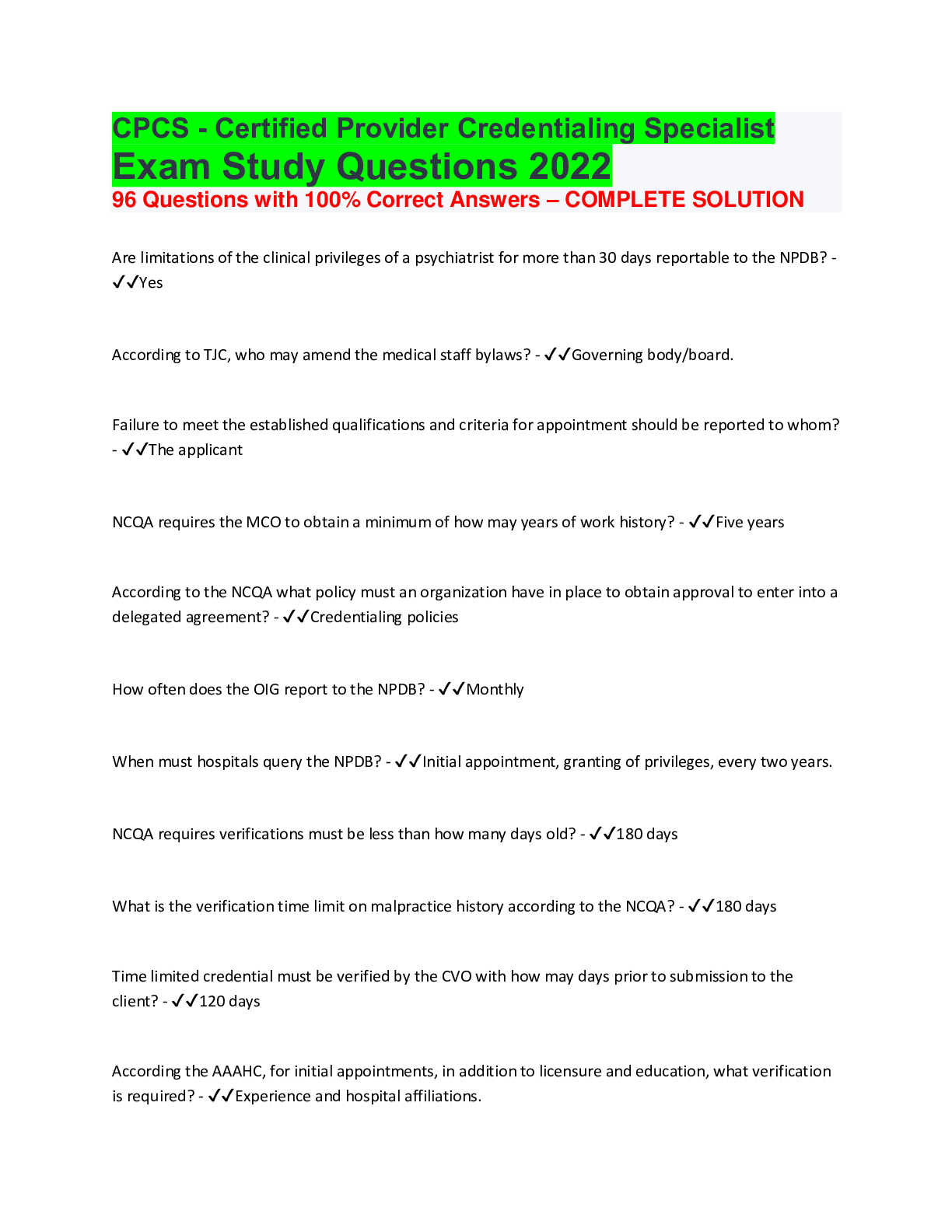
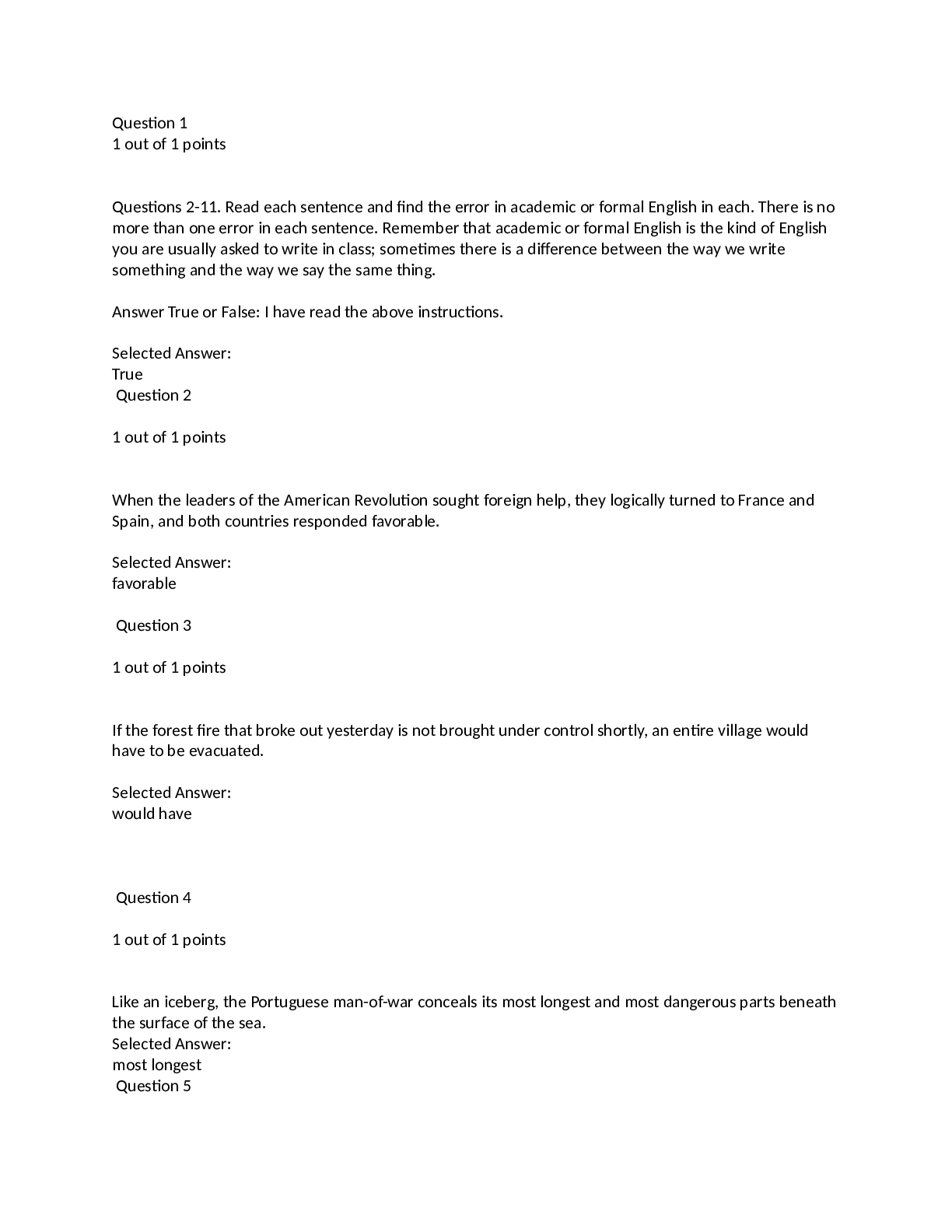
.png)
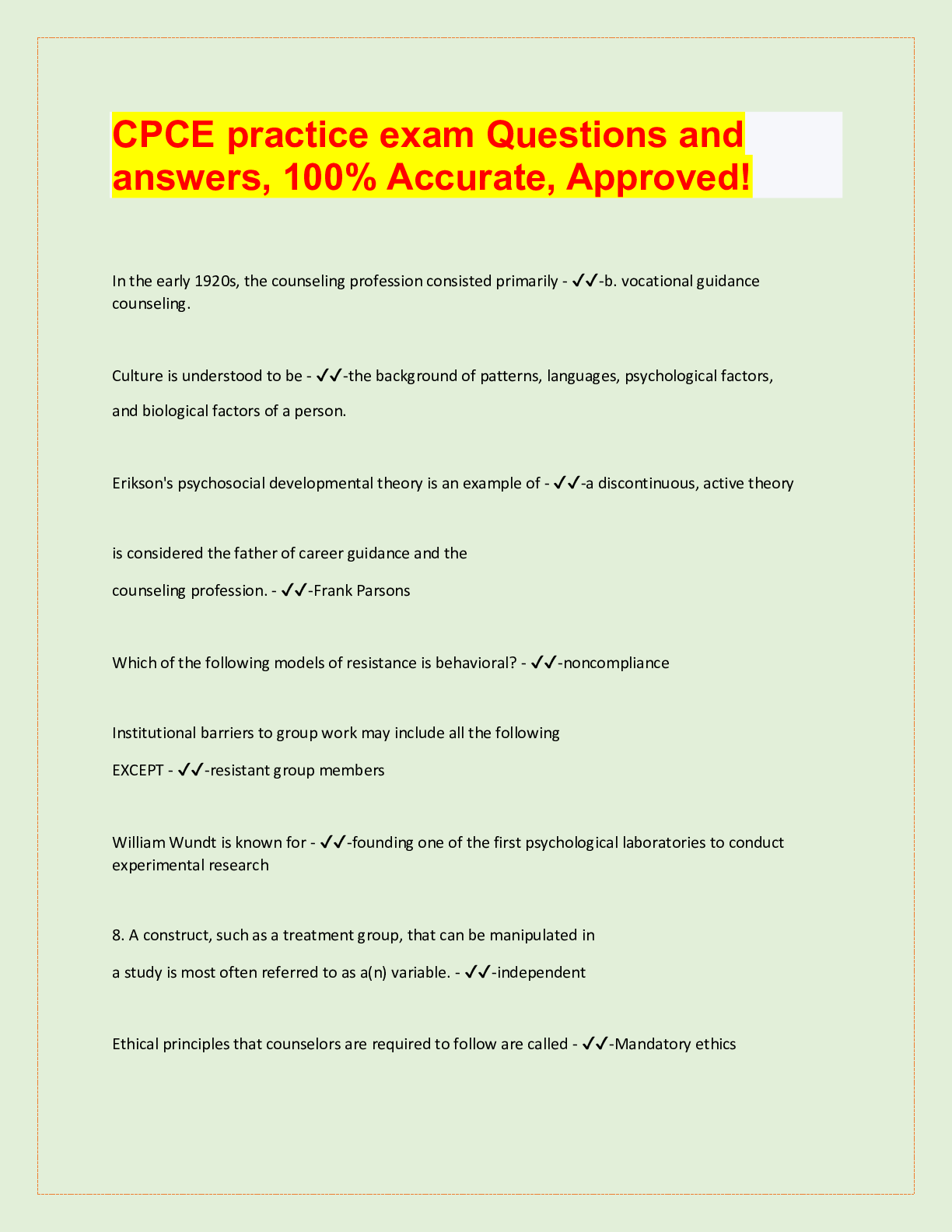

.png)
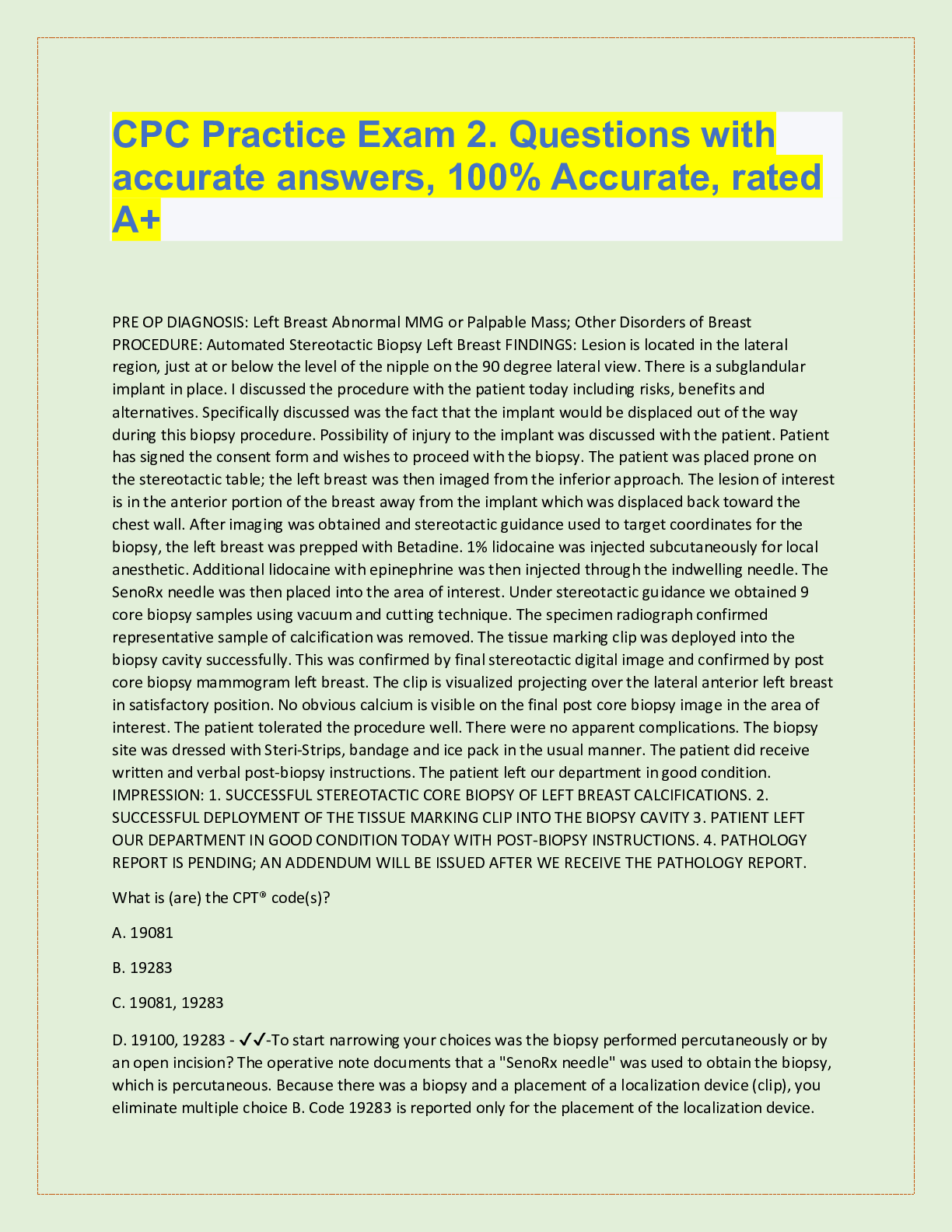

.png)


.png)
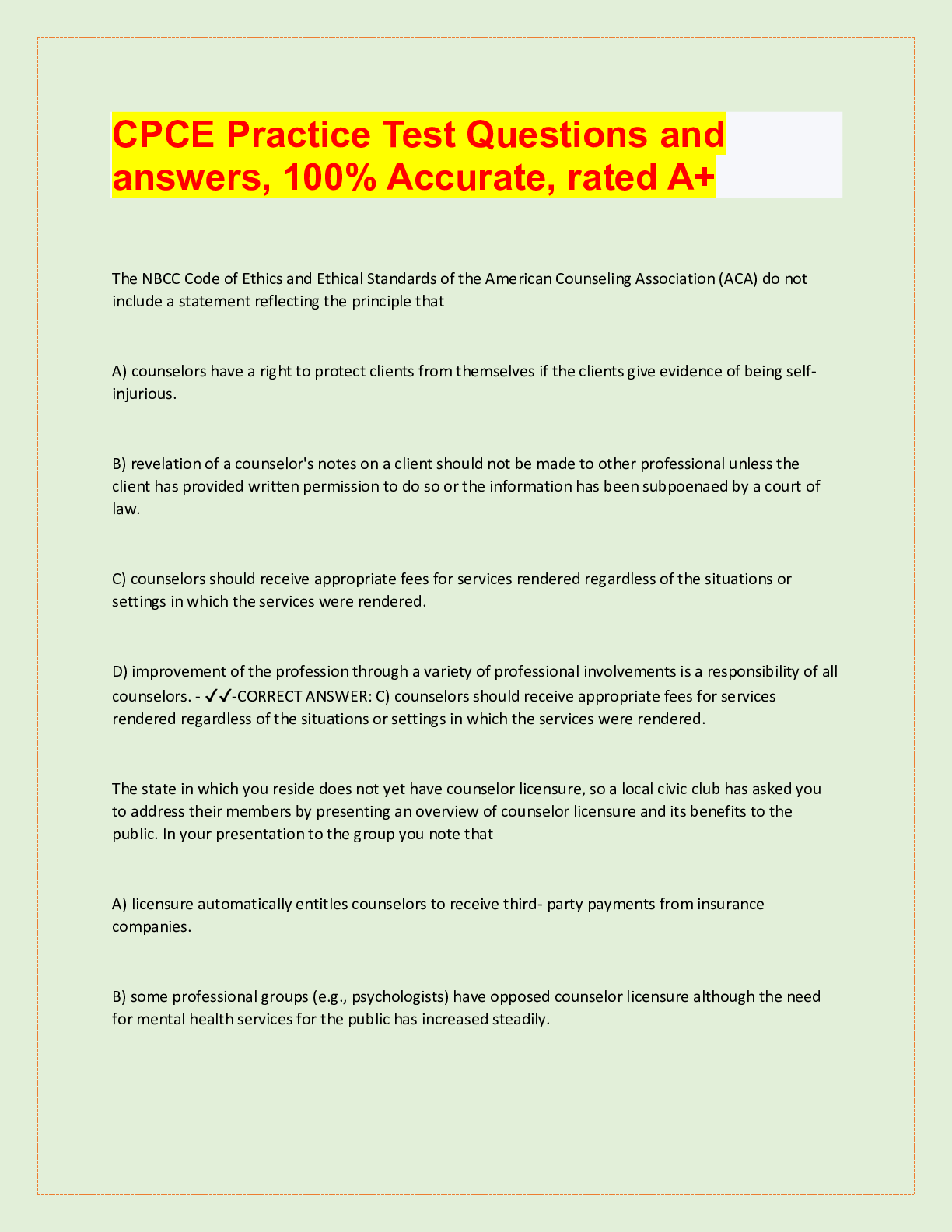
.png)
.png)
.png)
